Nifty narrow garden ideas to make the most of a slender plot
Maximise your elongated layout
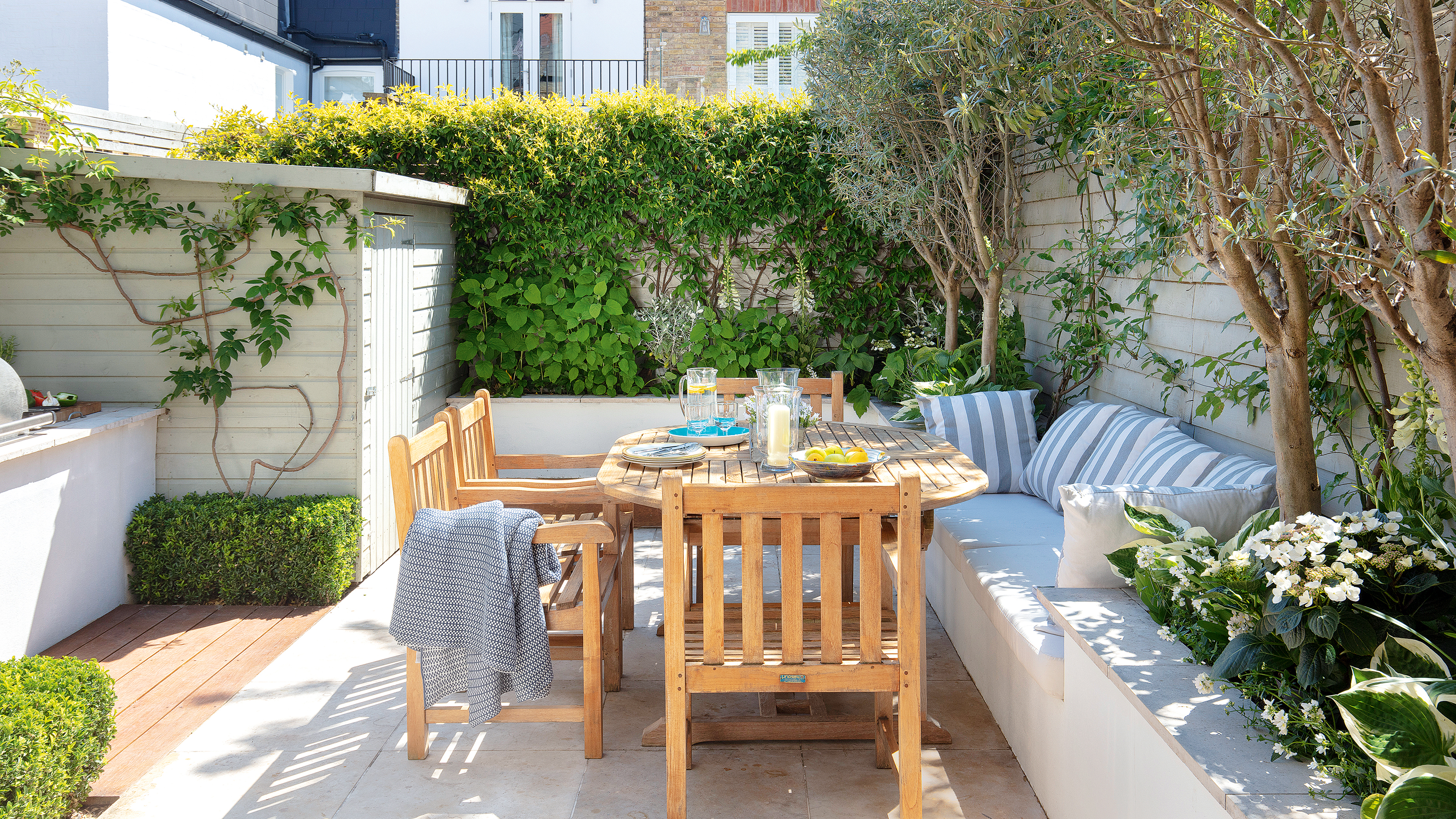

Thea Babington-Stitt
If you have a long, slender outdoor space, then you can take this opportunity to create a stand-out space with narrow garden ideas to make the most of your area. These thin spaces can be easily adapted to give you a backyard with zones for relaxing, planting and alfresco dining.
While narrow gardens can of course come in all sizes, they are usually fairly small gardens in terms of square footage, but this in and of itself comes with plenty of pros, not least the lower budget than larger outdoor spaces. 'The cost of garden landscaping and maintenance is mostly influenced by the size of the space that requires work, so the cost of projects for narrow gardens is likely to be cheaper,' explains Jack Sutcliffe, co-founder of Power Sheds.
Narrow garden ideas
A good garden layout can make your narrow garden ideas work no matter the size or shape of your plot.
‘The first step when designing a narrow garden is to work out what you want your garden to look like, and how you want to use it,’ advises Rian Habergham, garden expert at Leisure Bench.
'You can choose to have lawn space running down the middle which is great for households with children or pets, or you can choose to create zones within your garden for multi-use, for example a seating area, some flower beds or a vegetable garden.'
'Dividing your garden up like this can help you get more out of your space by having different sections for different activities.'
1. Plant vertically
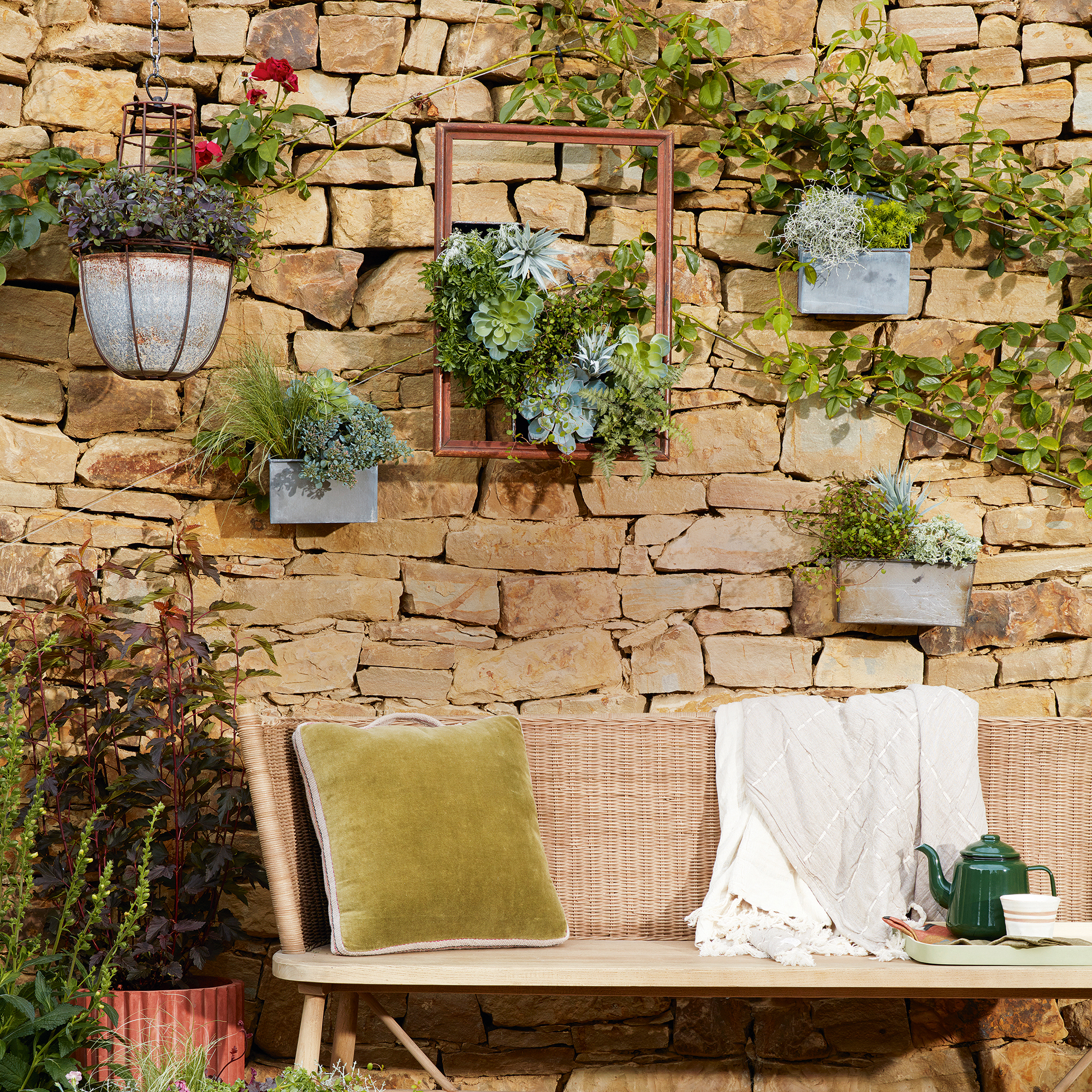
One of the easiest ways to recoup square footage in narrow garden ideas is by lifting plating up onto your walls or fencing. Whether by utilising trellis ideas, or attaching hanging pots and planters, it's a simple way to ensure colour and life along your space without cluttering up the ground.
Get the Ideal Home Newsletter
Sign up to our newsletter for style and decor inspiration, house makeovers, project advice and more.
If you walls are tall, this is also a clever way of including plants or flowers that you may not have been able to otherwise if there's a lack of light elsewhere in the garden.
2. Use decorative borders
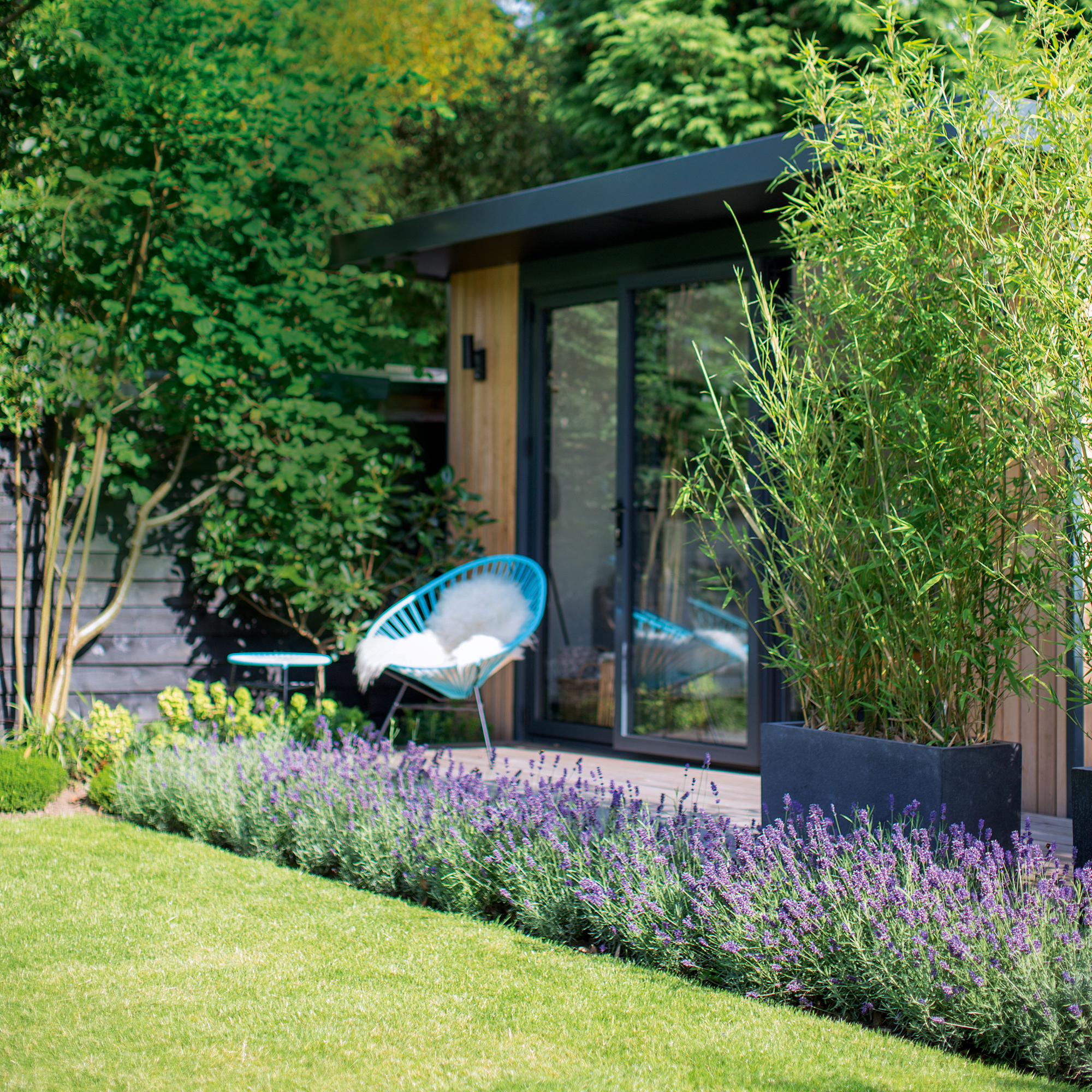
A good garden border can make all the difference to a space, and it's a lovely way to add personality to narrow garden ideas. You only have to use a relatively small amount of ground for the border itself, but it'll add far more impact than you might otherwise expect.
Colourful, fragrant plants are always a bonus, here, and you can also do your bit for the ecosystem by selecting wildlife friendly options, such as perennial favourite lavender.
3. Lead the eye to seating
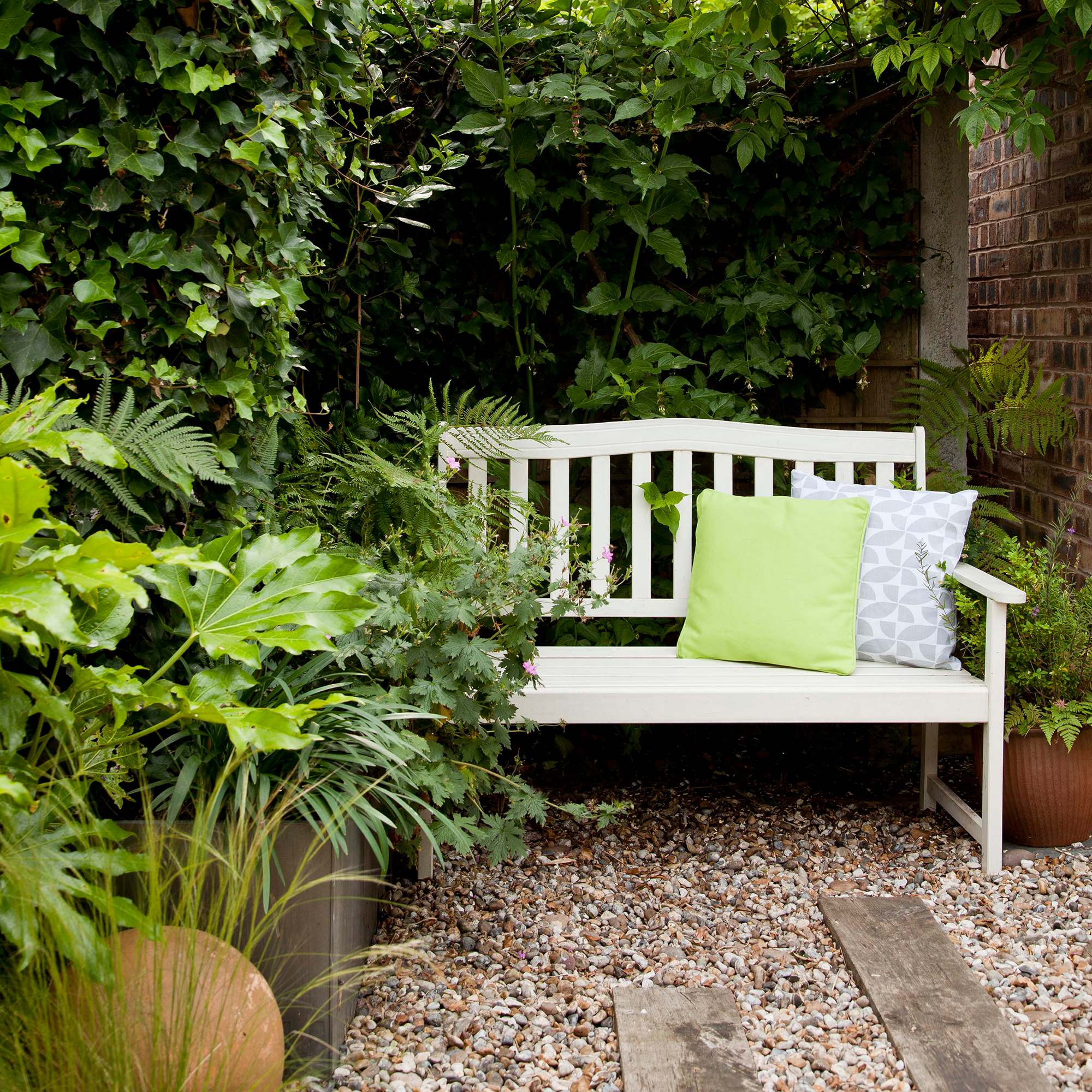
In a slender space, leading the eye towards the end will visually elongate the area, making even smaller gardens seem longer and larger. For your focal point it's worth considering a bench which you can paint in an eye-catching shade.
Surround with pots and maybe some solar garden lighting to create a heavenly hideaway that'll be just as impactful whether if being used for a morning coffee or for an evening catchup with a friend.
4. Add a slimlime cooking station
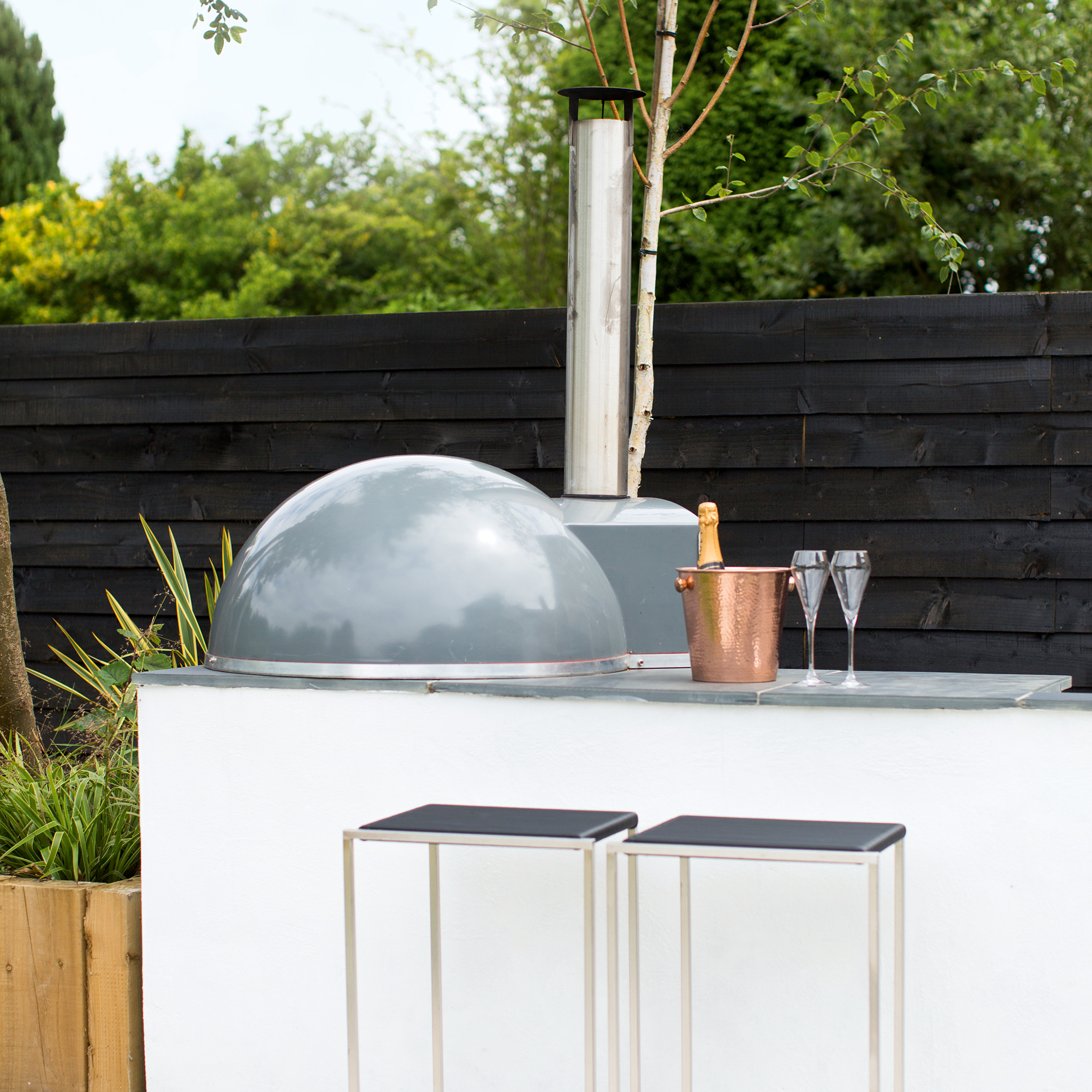
If you only associate outdoor cooking areas with vast gardens, then it's time for a rethink, because small outdoor kitchens are far from lacking in style or substance.
In more narrow spaces, mimic the shape of your garden by choosing a slimline design and one of the best small BBQs or pizza ovens, depending on how you like to host. Slender bar stools create a perfect seating area right at the counter, too.
5. Mix up materials
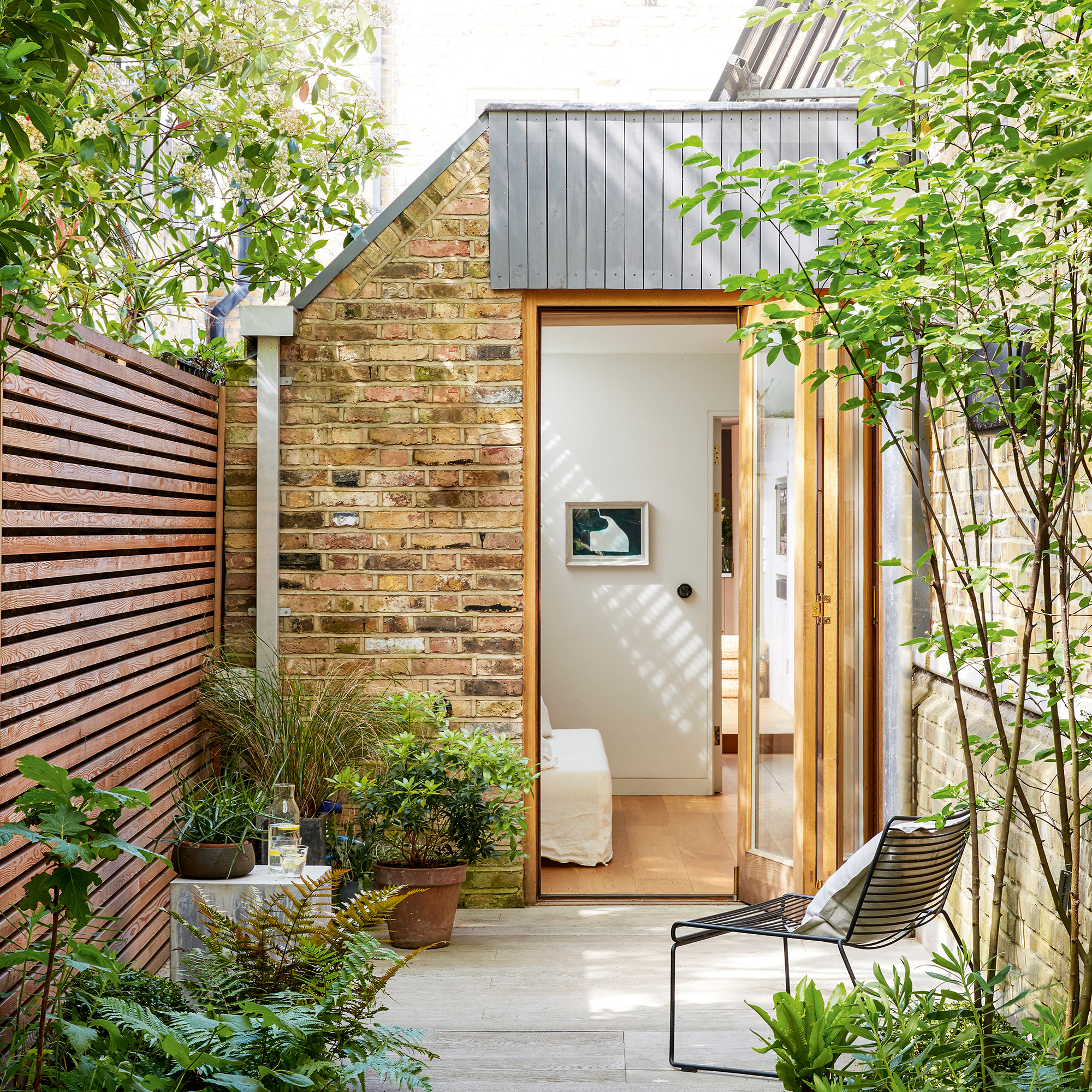
When it comes to planning your narrow garden ideas, things often depend on just how narrow we're talking. If you only have the bare minimum of a strip of land, turn your attention to the surface materials to design the space that way.
Mix and match the materials and colours of your exterior walls, fencing and paving to add interest without using up any space at all.
6. Add pots to raised beds
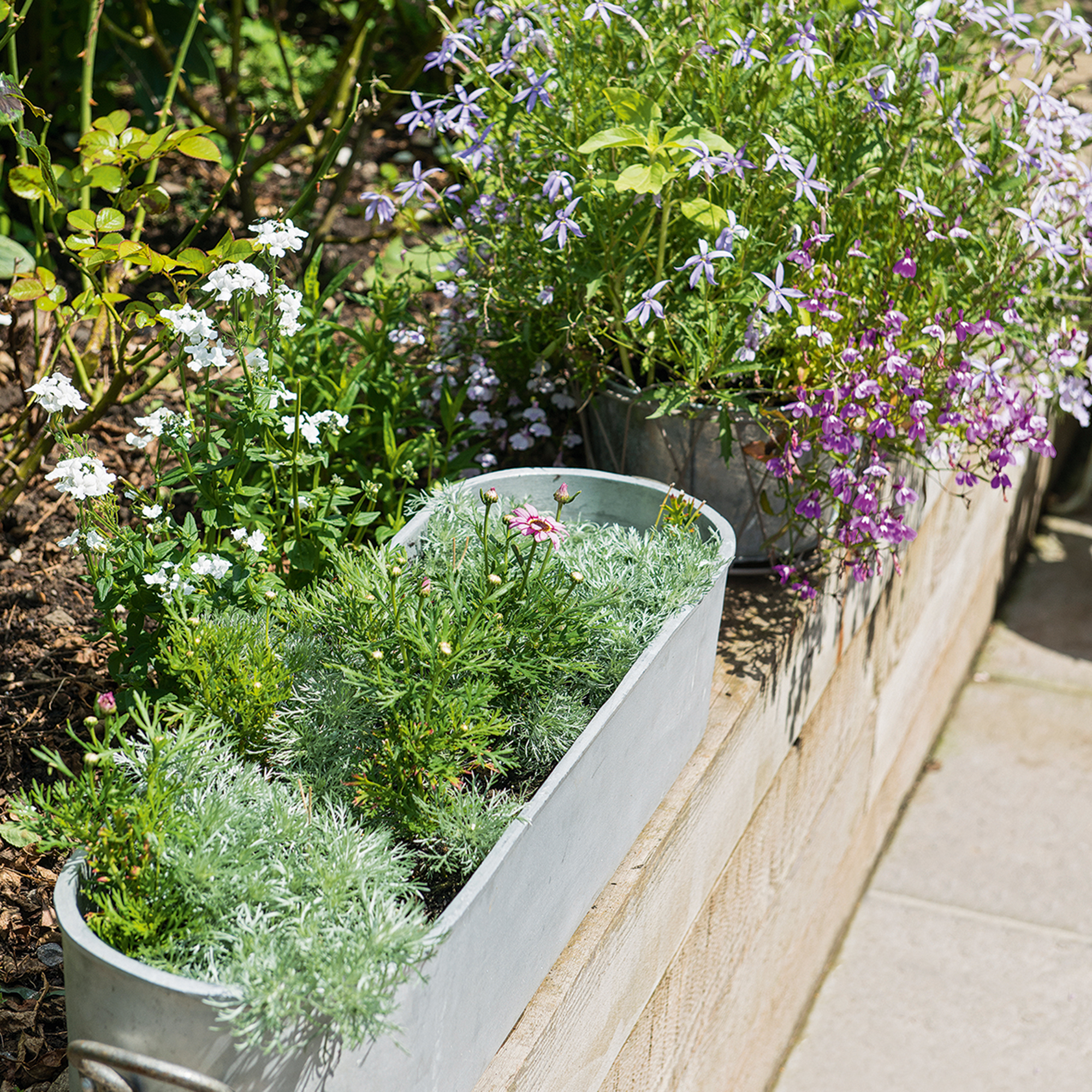
Get creative with utilising every raised inch of your narrow garden ideas to avoid cluttering the ground itself. If you have raised garden beds in place, use the frames to hold potted plants, doubling the amount of veg or flowers you can grow.
Container gardening is having something of a moment, so you'll be pleasantly surprised with just how effective the humble pot can be.
7. Build in benches
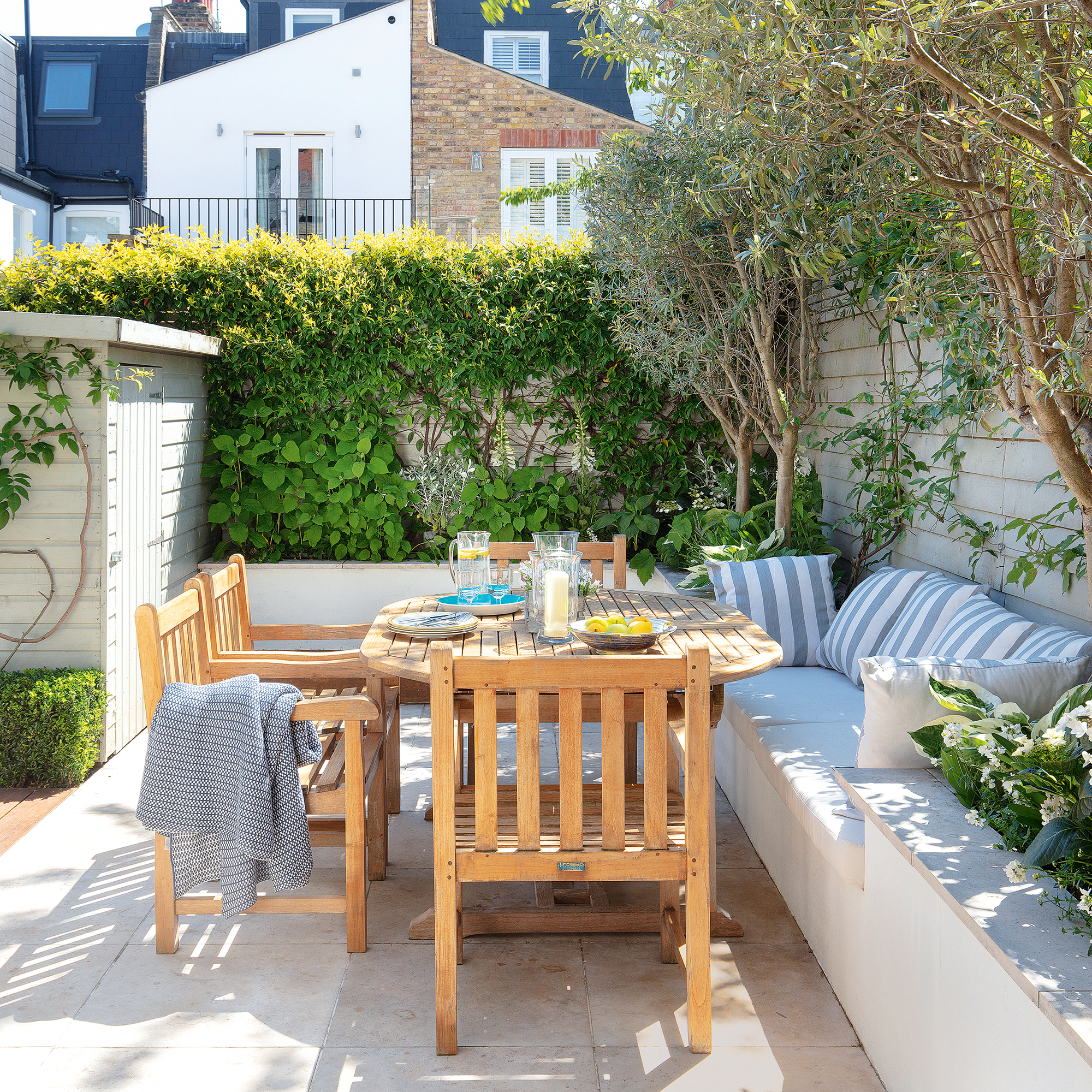
Follow the lines of your layout to add in-built garden furniture for outdoor dining. Benches used on one or two sides of a table drastically reduce how much room the dining area will take up, and you can push the table right over the benches when not in use, or if you don't have a full party.
8. Use multifunctional furniture
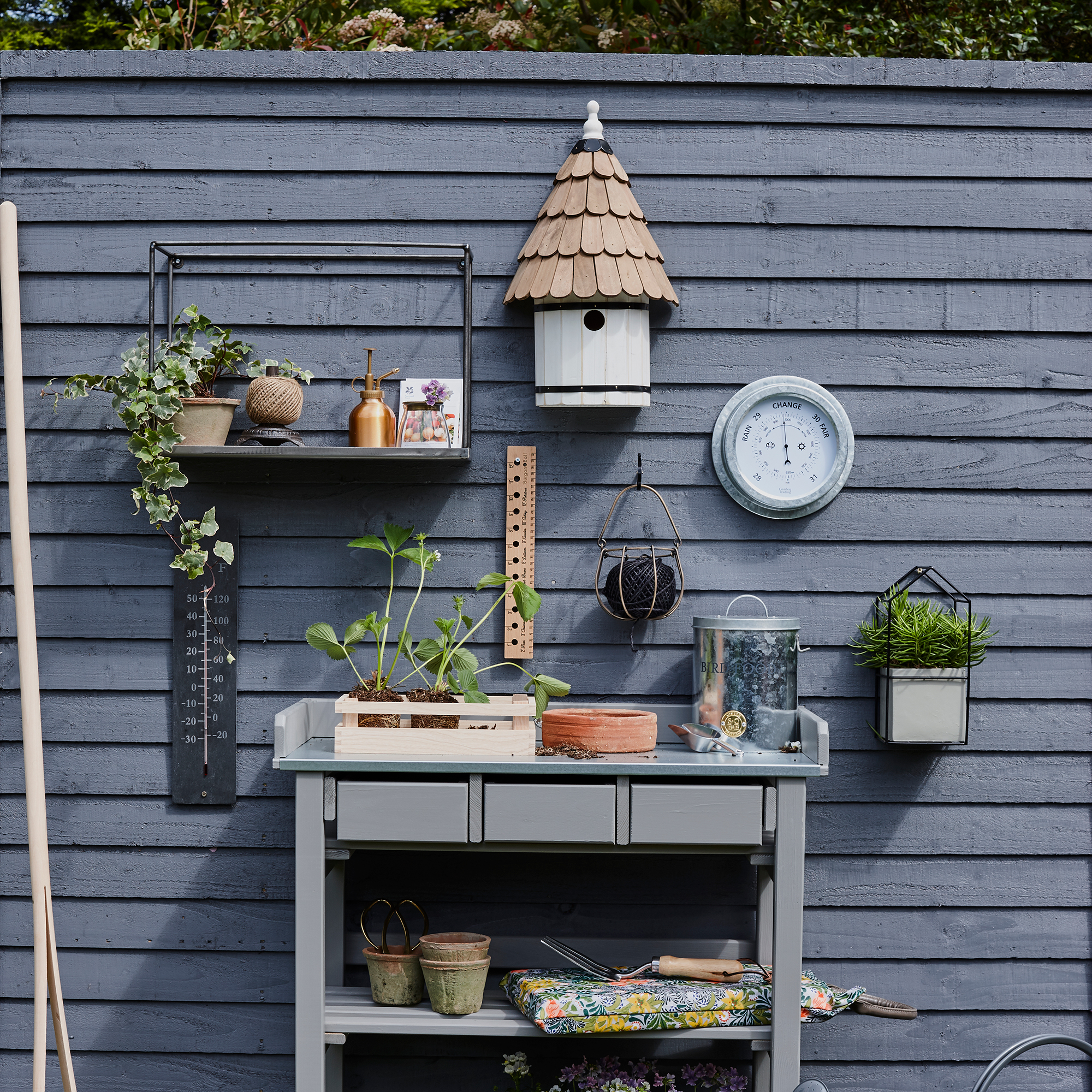
‘One of the best ways to furnish narrow garden ideas is to invest in multi-functional furniture, such as opting for a stool that can be used as both seating and a small table, depending on the day’s needs,' advises Rikke Blaeside, design and range manager at JYSK.
'Another great multi-functional furniture piece is a garden bench, this can be used to seat 2-3 people, as a coffee table for food and drinks or even as a footrest for added comfort when relaxing – just add cushions,’
Trolleys make a great option for garden storage ideas and can be bought in the best size for your garden, perfect for not overwhelming a narrow garden. Trolleys are easy to move around and can be used to hold drinks and food when entertaining or to house potted plants or herbs.
9. Don't just plant tall plants or trees
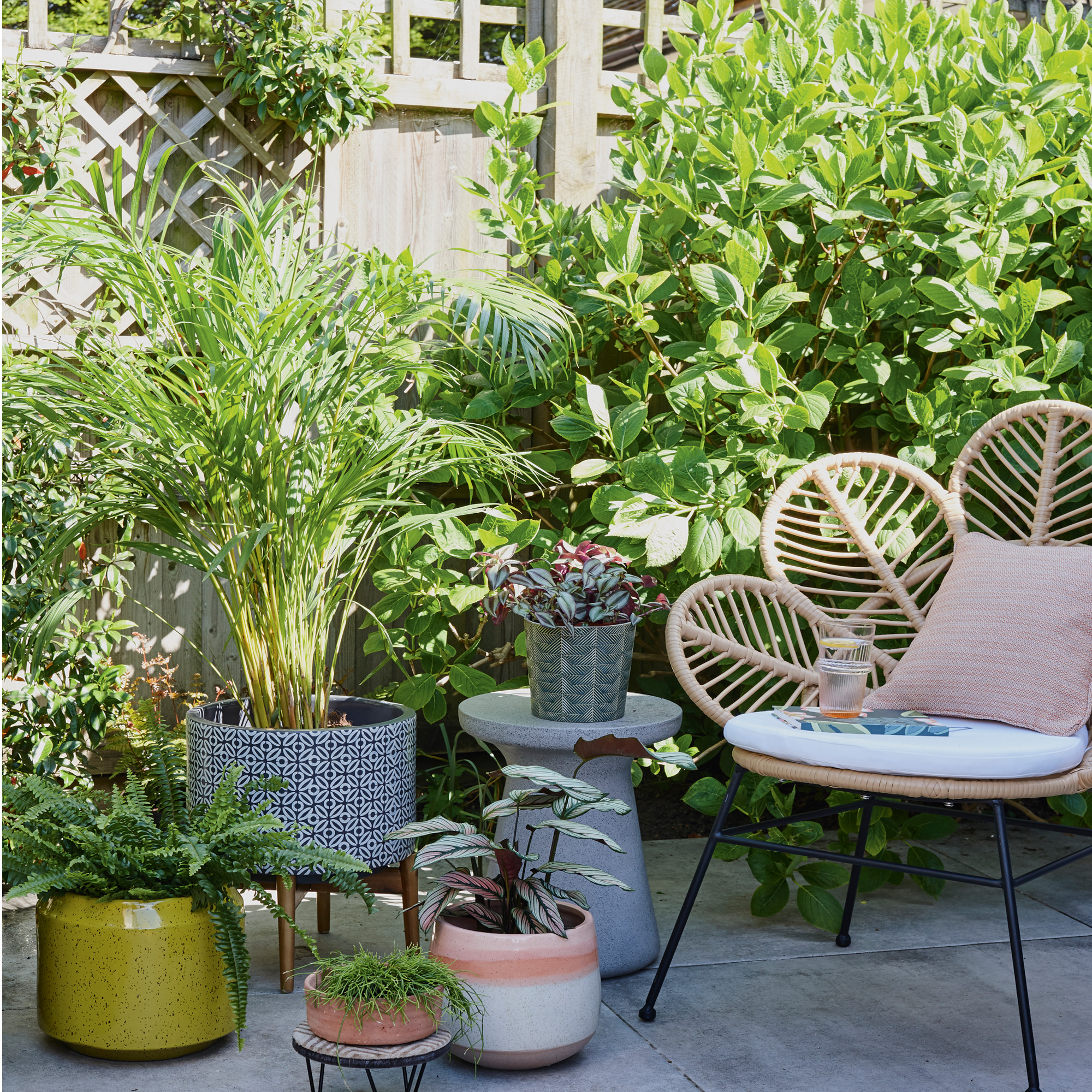
‘Try not to plant tall trees on either side of the garden, as this closes in the middle space,' suggests garden expert Rian. 'Try planting large plants and trees in an alternating order, so that when you have a tree on one length of the garden, you have space on the other. You can use this space to create more indistinct zones, and this space is ideal for children to play in.’
Espaliers are easy to train and shape in a variety of forms and are perfect for small garden ideas and narrow spaces. They are ideal for adding greenery to walls or fences which will make your garden look like it goes right up to the edge of your plot, making it appear larger. These trees also produce beautiful foliage, flowers and fruit. Erigeron is good at growing in small cracks and crevices and is a self-seeder so will gradually spread and fill in narrow borders.
10. Don’t overcrowd the space
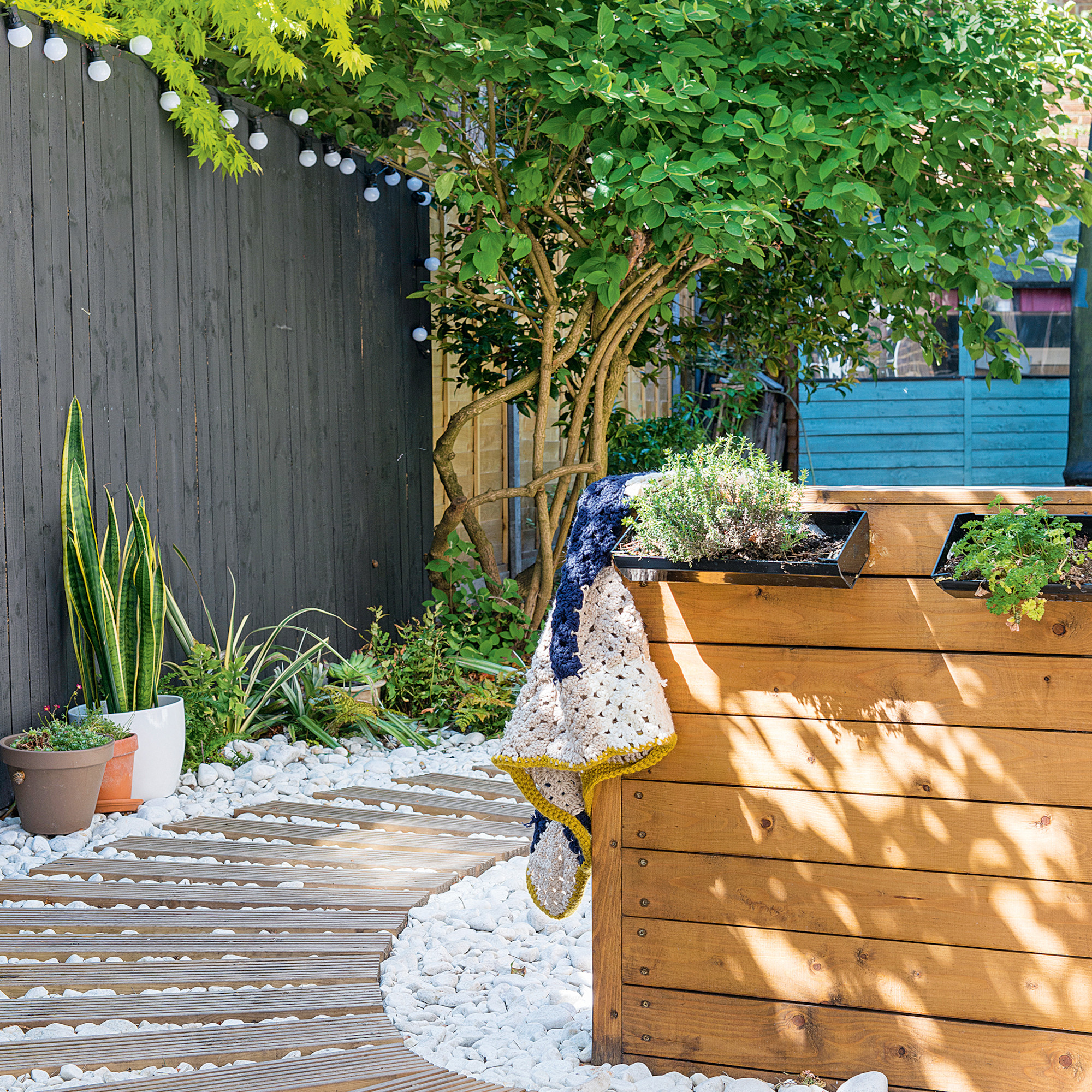
‘Don’t overcrowd the space with furniture,’ says Sarah Wilkie, co-founder of Home Barn. ‘Of course, it’s important to have furniture in the garden for entertaining, but having too many pieces of furniture that are too big for the space will overcrowd the area.'
'Keep the hedges trimmed back to allow the sun to stream through. Having an organic overgrown garden is a lovely look however in a smaller garden it can lessen the aspect of space.’
As well as being selective with your garden furniture ideas, keep the same idea in mind when it comes to your planting, don’t overfill your garden borders with too many different plants, especially if they are tall. Alternate the height of your plants among your garden borders to give your space visual interest and prevent your borders from feeling like a solid border hemming your garden in.
11. Layer your lighting
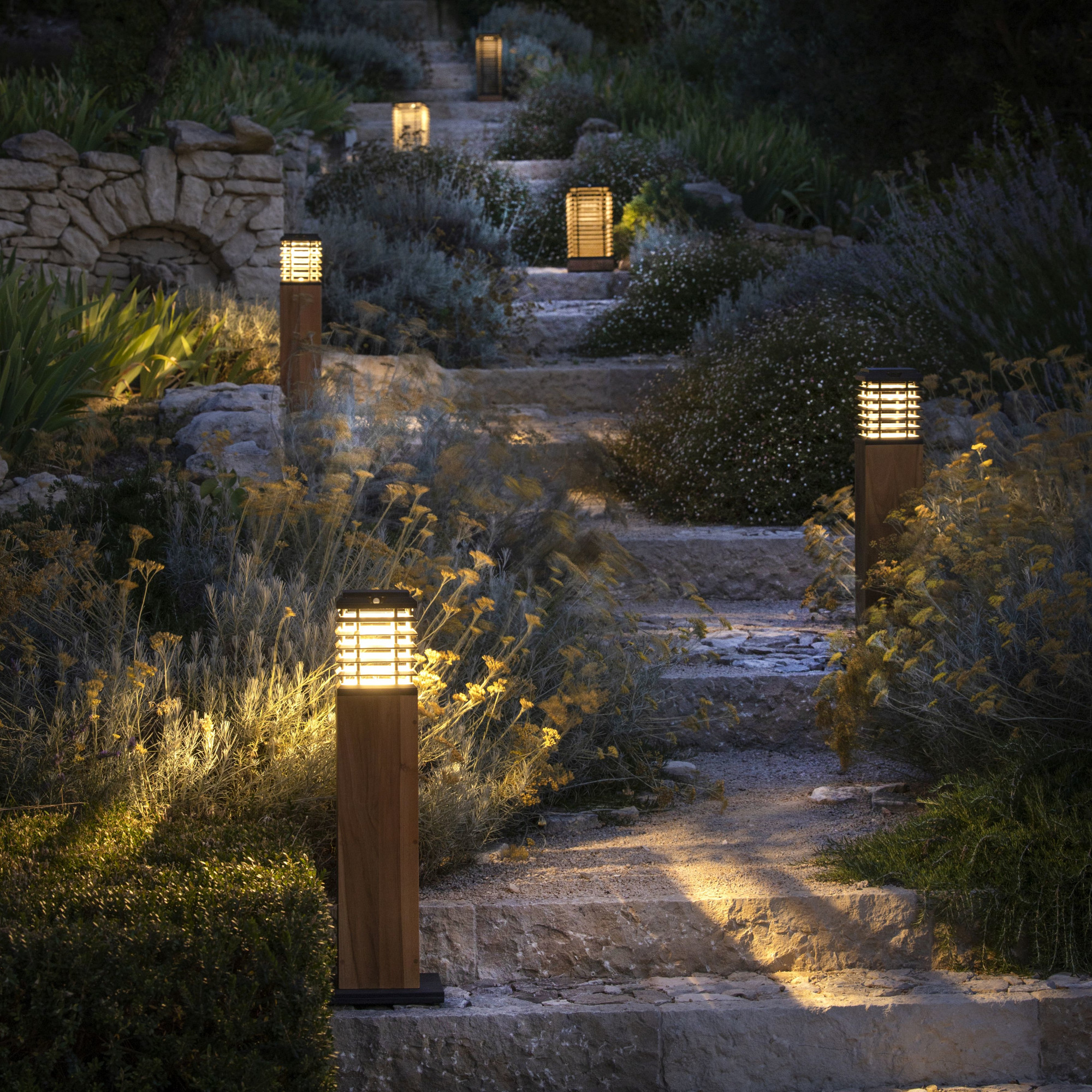
Your garden lighting ideas can transform a garden space and give the illusion of more space. Use festoon lights or fairy lights to draw the eyes upwards rather than across which will show the narrow nature of your garden.
For lights that provide a glow without a glare, use downward-facing wall-mounted lights. Also, don’t be afraid to experiment with different angles and positions before permanently installing your lights.
‘Work out which elements of your outdoor space you wish to highlight for practical and aesthetic reasons,' advises Mara Rypacek Miller, managing director at Industville Ltd. 'Layer your exterior lighting and use multiple sources of light, including small lights to guide walkways, up-lighting for highlighting beautiful plants and trees, low lighting for ambience and wall lights and pendants in areas for eating and socialising.'
‘It is also important to ensure the lights are independently controlled, as well as installing dimmer switches for each light source, if possible, to allow for a wide variety of moods to be created throughout the evening.'
12. Add a vertical screen
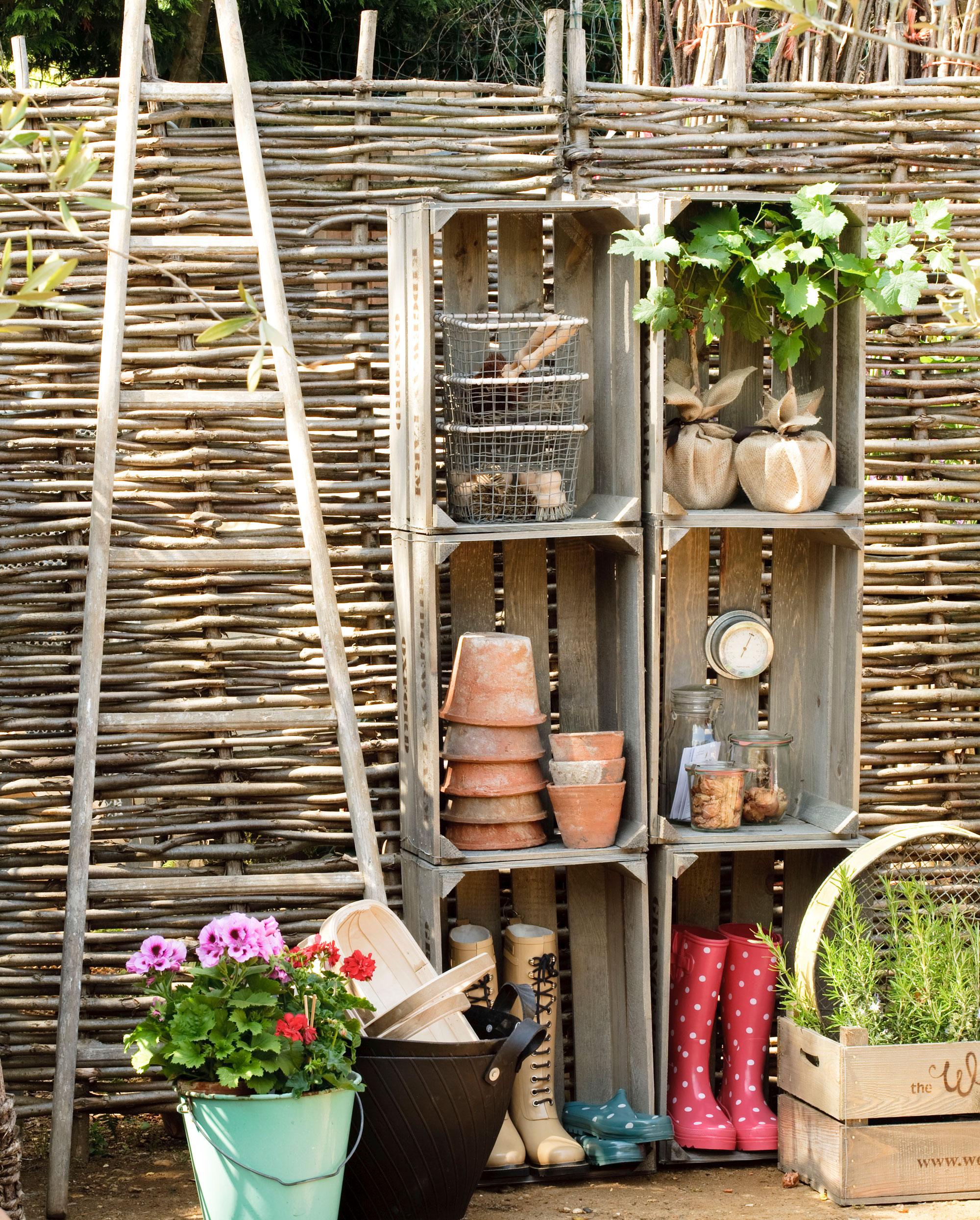
‘Vertical screening may give your narrow garden ideas more texture, contrast, and depth, enhancing its aesthetic appeal,' explains Martine Le Gassick, creative director at sustainable garden screening company Stark & Greensmith.
'Hard landscaping like screening can be softened quickly by climbing greenery and planters to create interest, whilst decorative screening creates a stylish focal point in your garden.'
A vertical screen is an easy garden idea that is great for zoning a narrow garden and can be made in various shapes and sizes to suit your garden. Screens can be created from natural materials such as wood, bamboo and reed which will blend in with the rest of the garden.
‘Tall fencing can dominate a narrow garden, reducing natural light and visibility to create a cramped outdoor space,' adds Martine. 'By fitting short fence panels with a trellis on top, you can prevent that issue. They'll aid in adding natural light to your garden, giving it the appearance of being larger and more open.’
13. Use different levels
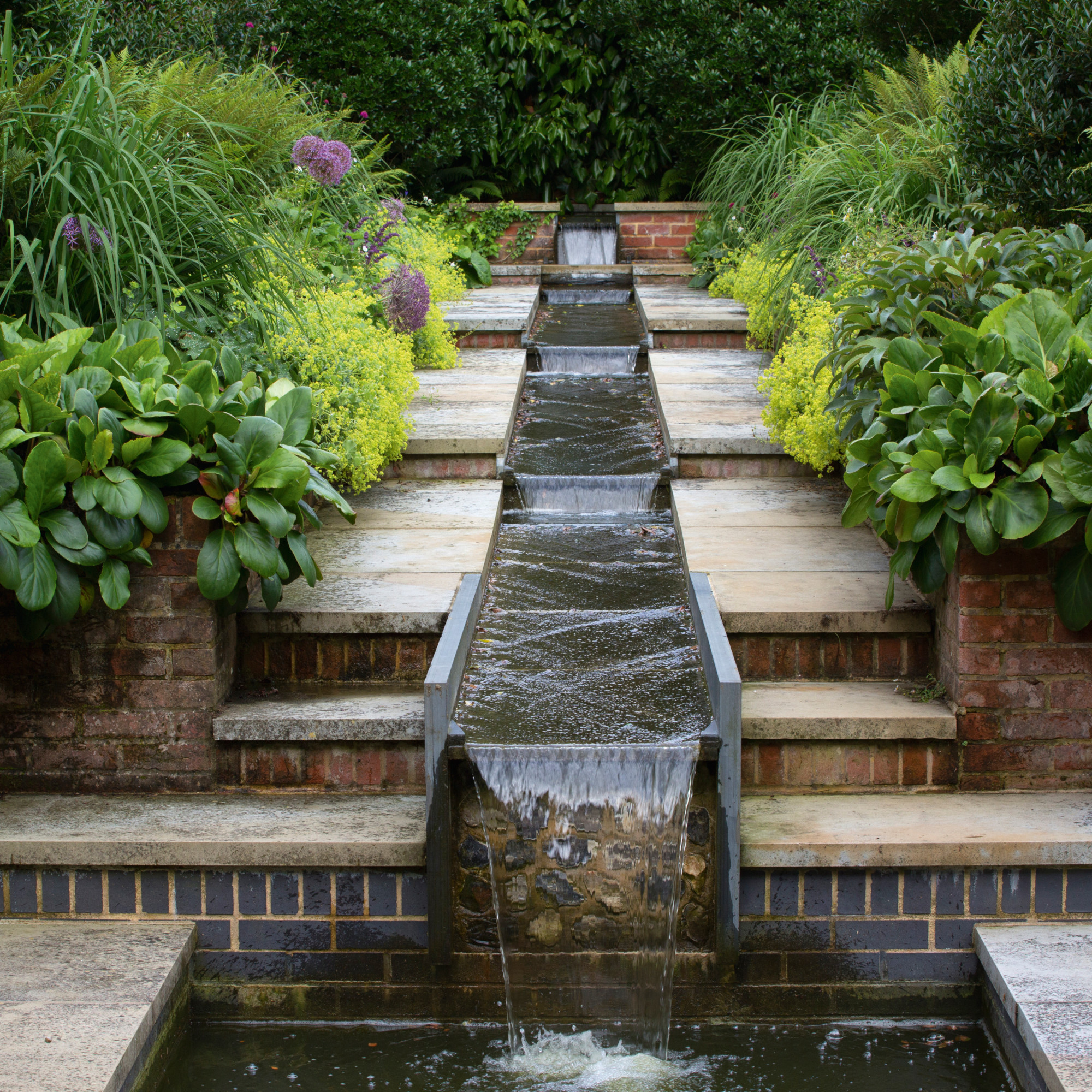
'One way to liven up a narrow plot is to add tiered garden ideas, position a seating spot on the higher level for the best view and add some screening to boost the sense of privacy,’ suggests Jack from Power Sheds.
Adding various levels to your garden will prevent the space from feeling like one long corridor. Curved landscaping paired with different levels makes your garden look bigger and adds more visual interest than straight lines and angular shapes. Using decking garden ideas or steps within your garden as an easy way to create different levels in your garden.
‘If you decide to go for a tiered garden, the higher level at the end of the garden can be a terrific spot for a fire pit or outdoor dining table,' says Jack. 'The end of the garden is also a great place for a playhouse or reading corner, where kids, mum or dad can go for some peace and quiet. Centring your garden around a lawn will give kids a place to run, play sports and let their imagination run free.’
14. Use light paint colours
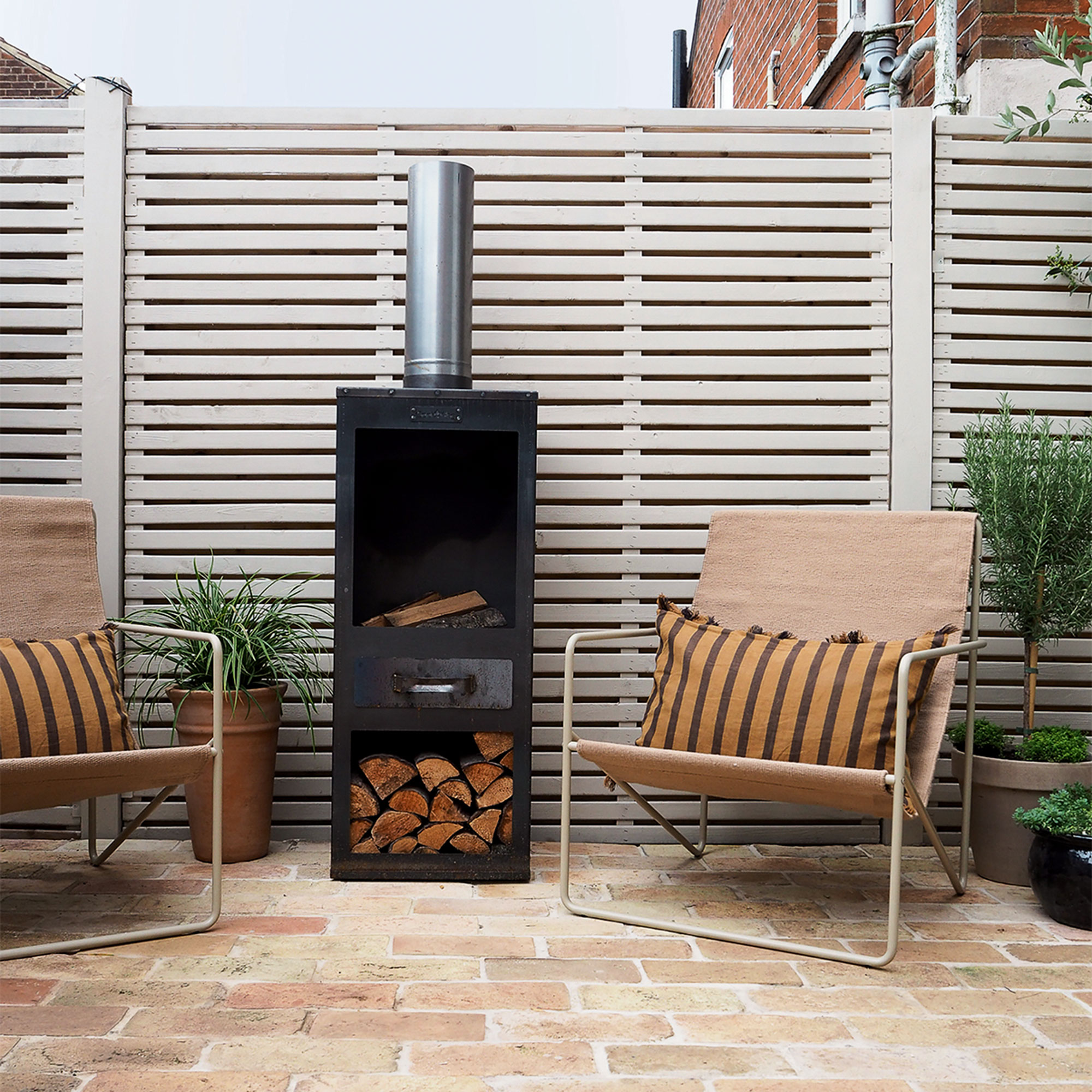
Your garden fence ideas can impact the look and feel of your narrow garden ideas. Long narrow gardens with fencing can make the space more shaded and feel darker. Painting a fence in a darker colour will absorb the natural light and make the garden feel even smaller. Instead, use lighter, bright paint that will bounce the light around your plot.
‘Paint with and utilise light colours for garden walls and fences,' advises garden expert Rian. 'Light colours make a space look bigger, so it's a good idea to opt for these instead of darker colours which can close your narrow garden ideas in.'
15. Break up a narrow garden with straight lines
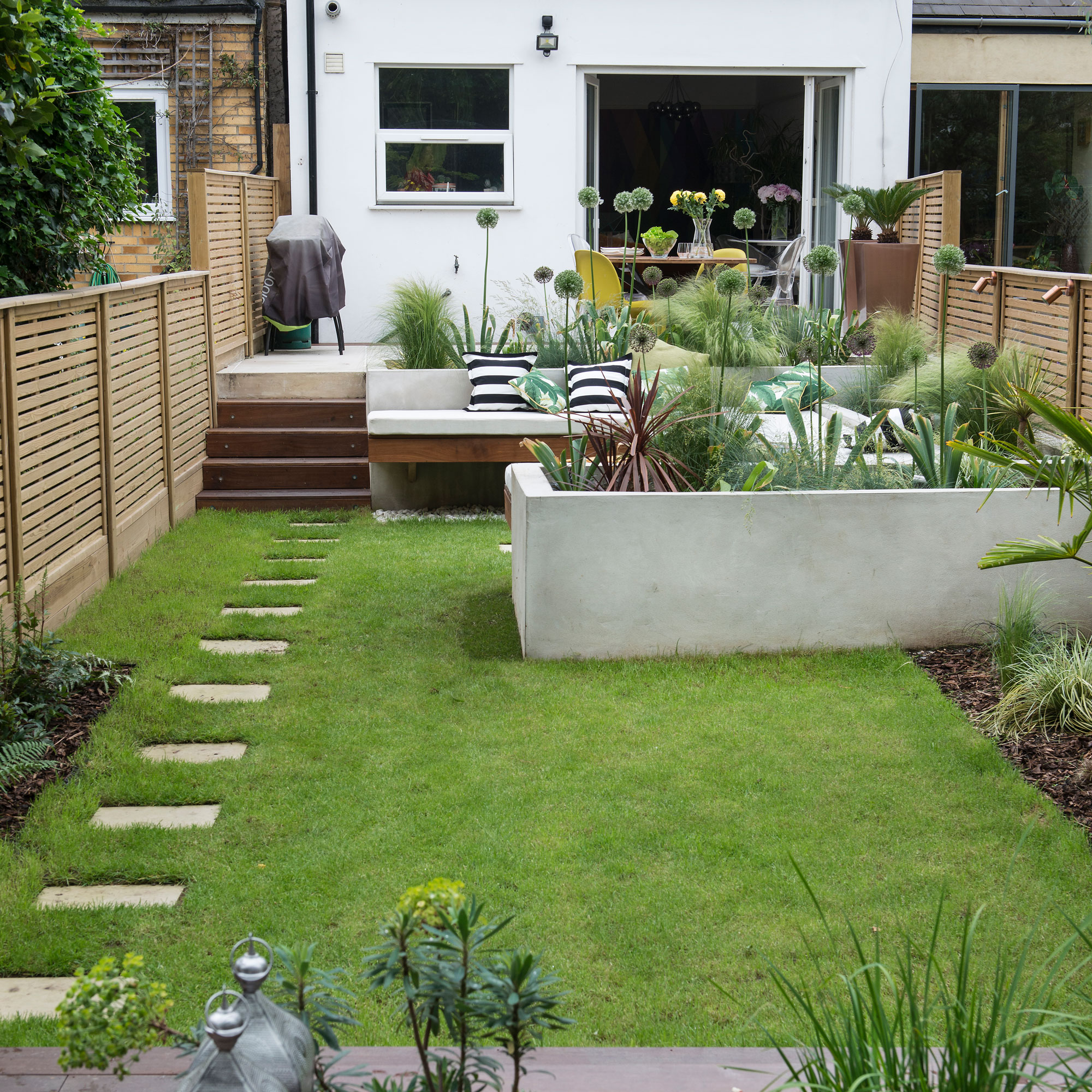
The temptation with a narrow garden is to push everything back against the side boundaries, leaving as large a space as possible in the middle. However, just as bringing the furniture in away from the walls of your interior space makes it feel bigger, so can this stylist’s trick work outside too.
Create a seating area that runs across the width of your narrow garden, varying the length of your sofas or built-in seating, while planting behind helps to break up the length. Use different landscaping to avoid a ‘runway’ of one down the length of your garden. Turf, decking and bark create different textures, dividing up a long, narrow-shaped garden.
16. Divide it with landscaping
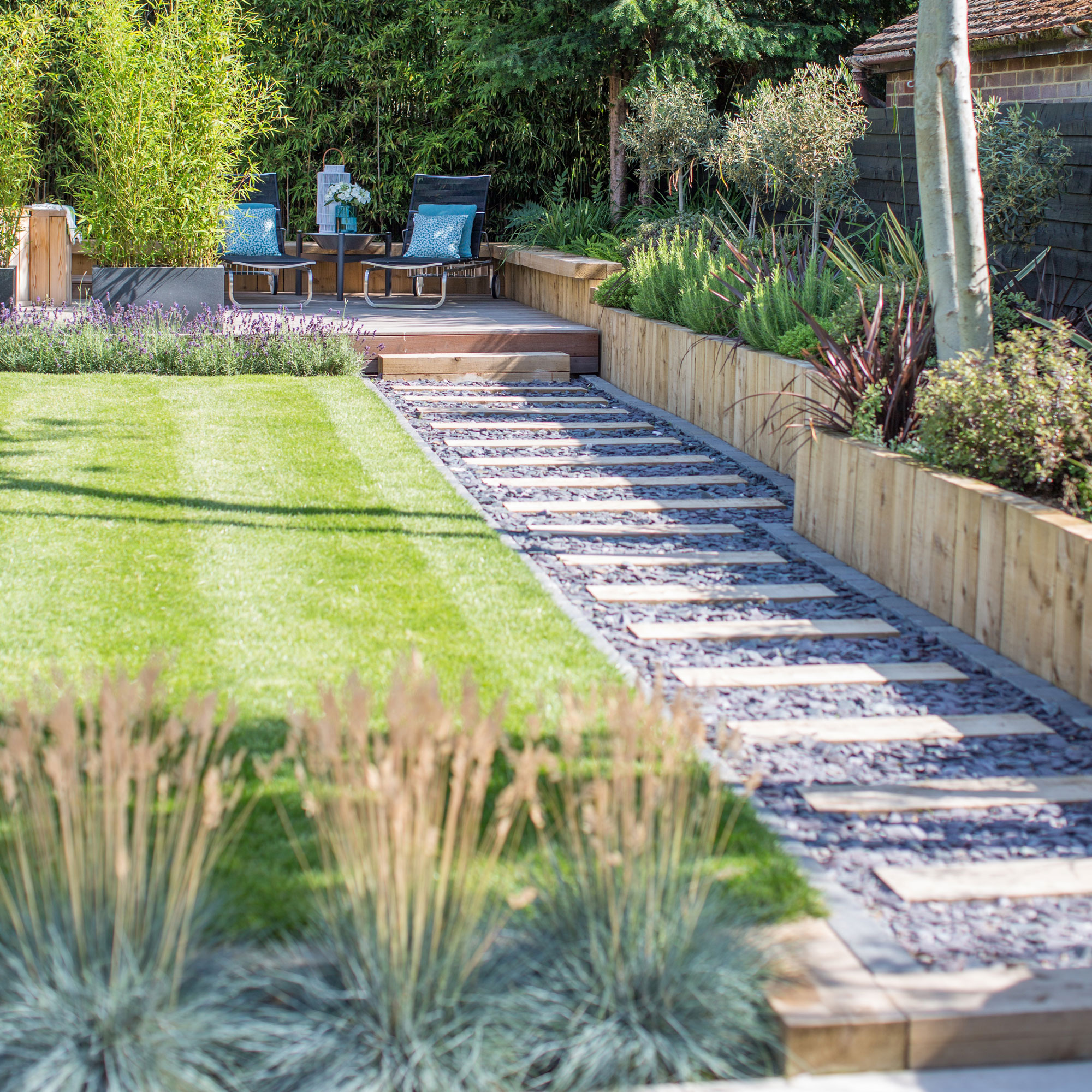
Dividing the width of a narrow garden can make it feel wider, especially if there’s a big change of landscaping materials – such as from turf to slate. Avoid choosing just one material – and if you want to lead the eye down your garden, try mowing your lawn with stripes that run its length, while stepping-stone planks running across can make it feel wider.
There are plenty of hints and tricks when it comes to planning a small garden; if you are dividing the length of your narrow garden with materials, then a decked or patio area that runs across the back of your narrow plot will bring these two parts back together again.
17. Play with angles
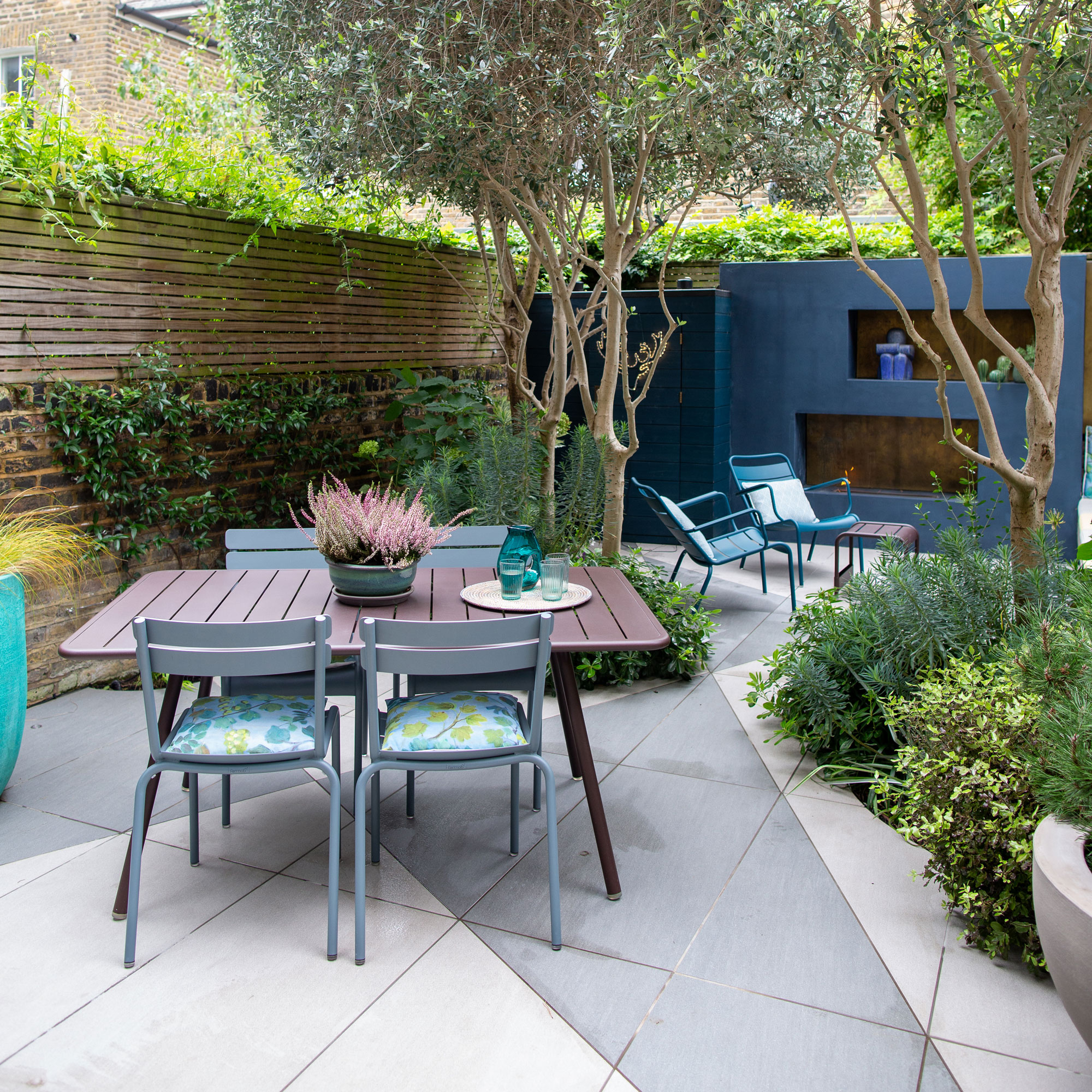
Create a fun geometric design with paving – it’s the perfect solution for narrow garden ideas as the eye is drawn to the sharp lines of the flooring, rather than its narrowness. Position furniture across such paving lines… it’s all about having fun with those angles.
Use planting to cut into the paving shapes, softening where needed, while trees planted two-thirds down the garden’s length lead the eye upwards, providing an overhead canopy and breaking up the space.
18. Zone a dining space
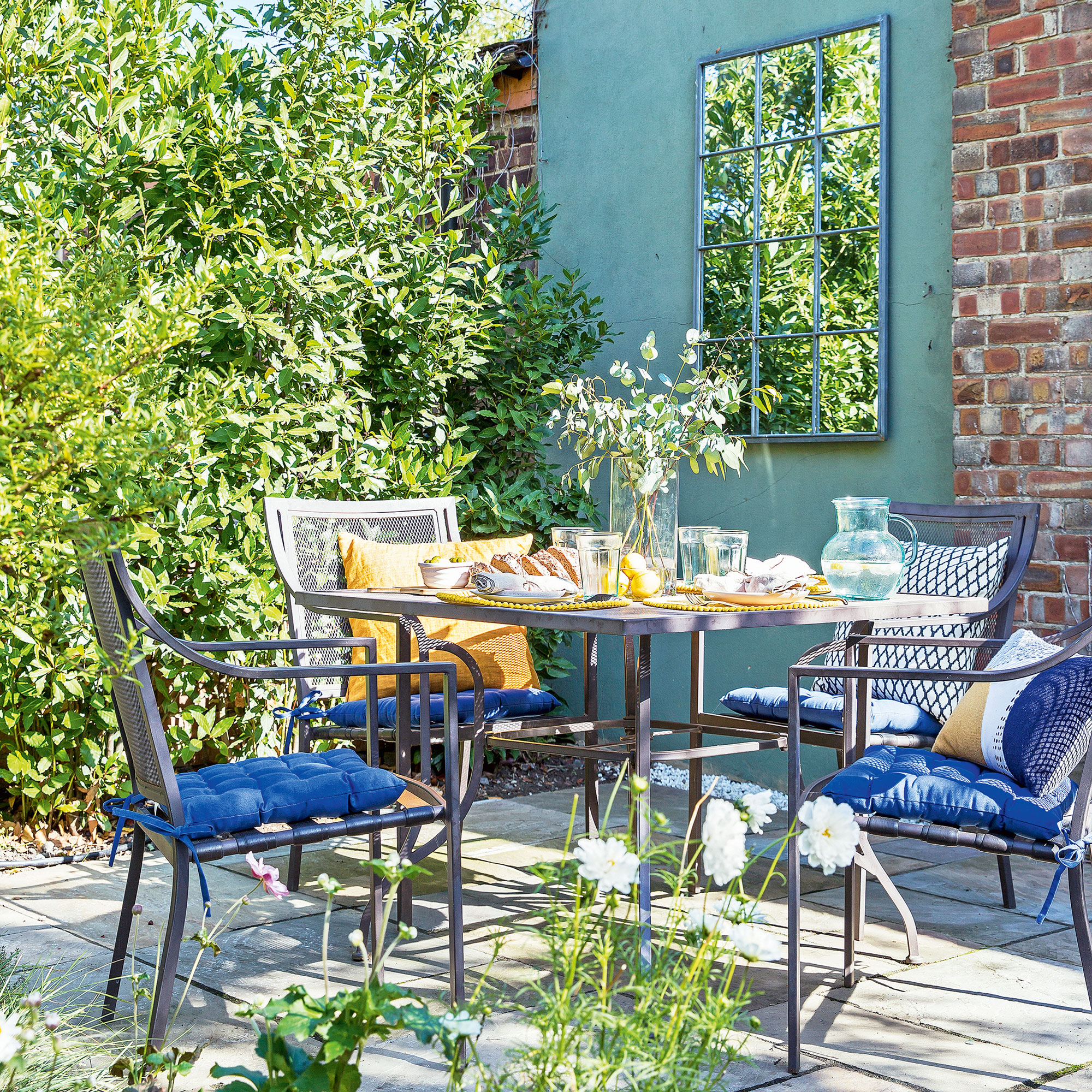
Just as we zone areas in a large garden, the same applies to a narrow plot too – it’s a great way to break up one’s length. These zones can flow from one into the next through similar flooring or can feel much more separate by using different planting schemes.
Steal tricks from interior design too for your small patio ideas, such as painting a feature wall and hanging up a mirror. Think about the shape of your garden furniture; a square set creates an intimate vibe that’s perfect for summery lunches al fresco.
19. Make your path a feature
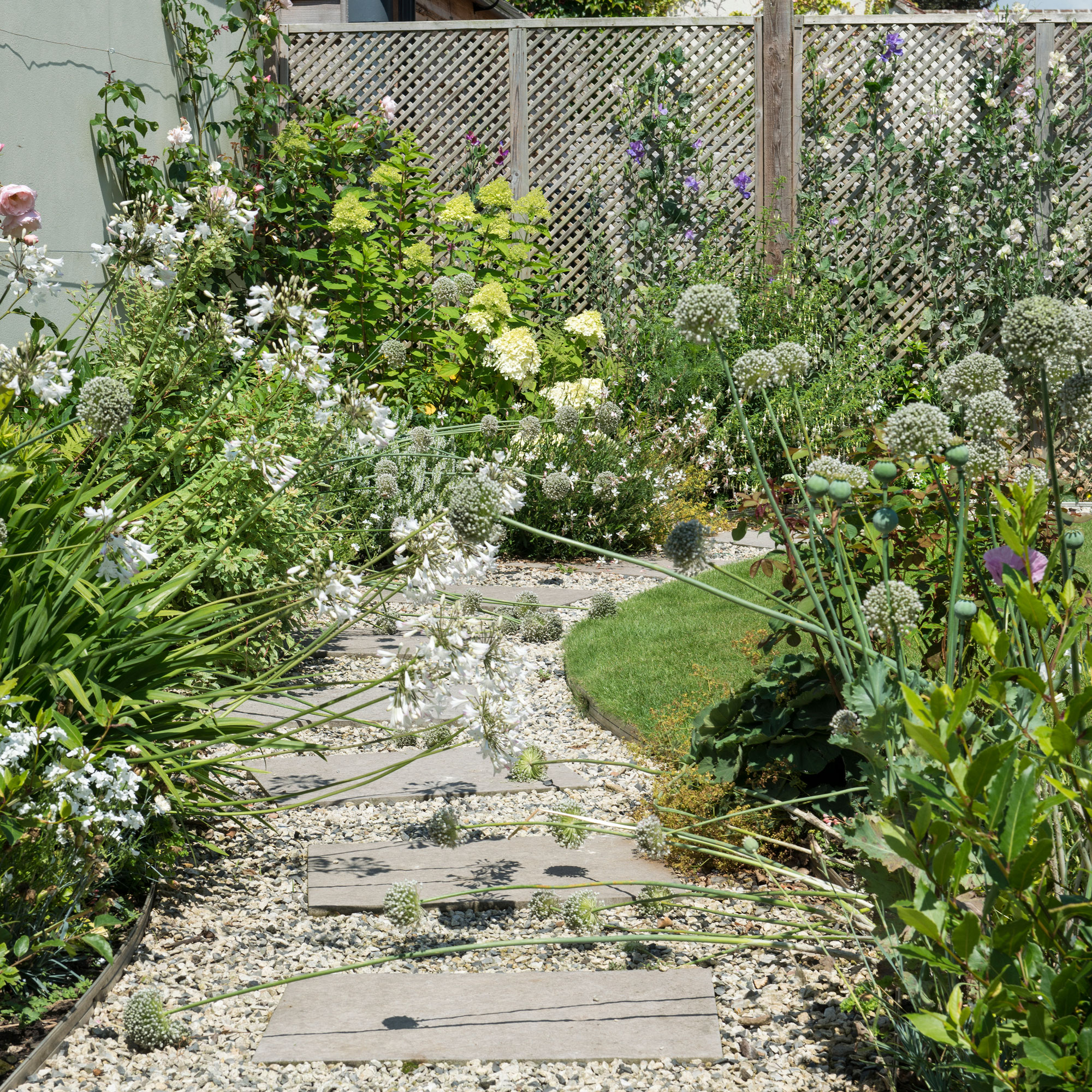
Paths don’t always need to run alongside a boundary. With narrow garden ideas, try bringing the path into the middle, where you can plant around it, encouraging a blurring of its edges.
Play with shape – a curved path leading behind a round lawn area leads the eye around rather than just down a narrow garden’s length. Choose materials that echo your planting when in bloom – alliums and agapanthus in white pick up on the shingle and pale slate stones.
20. Plant a hero tree centre-stage
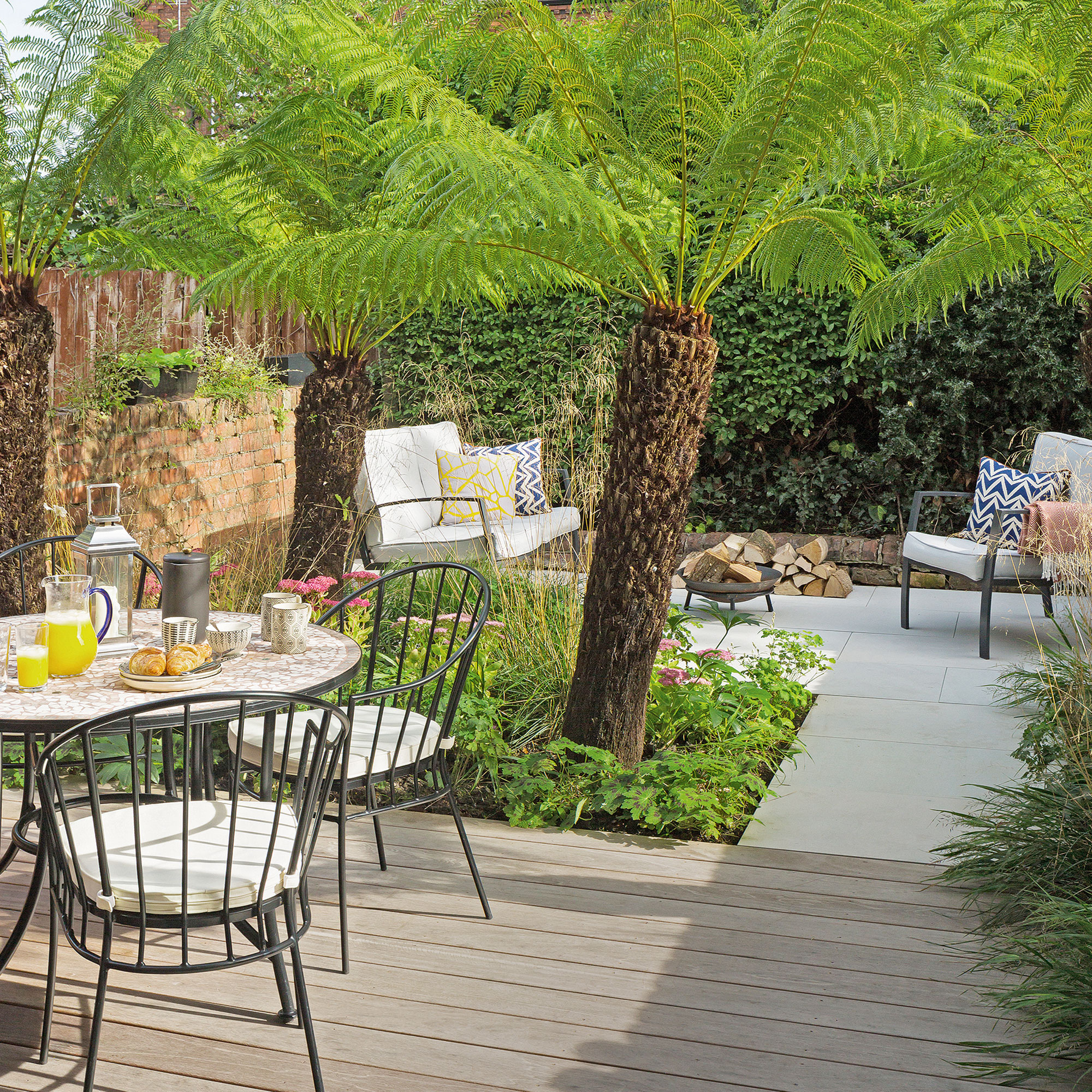
Go big with a palm tree planted in the middle of a narrow garden – it will become the talking point of your plot rather than its shape. A tree this amazing needs to be seen, so make it the hero rather than plant it against the boundary, and yes, you can have a big tree in a small garden.
Use a central tree to break up different zones, with a relaxed seating area behind the tree’s planting bed and a bistro spot in front. It will also provide year-round colour and shade. For more small garden inspo, head to our guide on how to make a small garden look bigger.
21. Install a garden room at the bottom
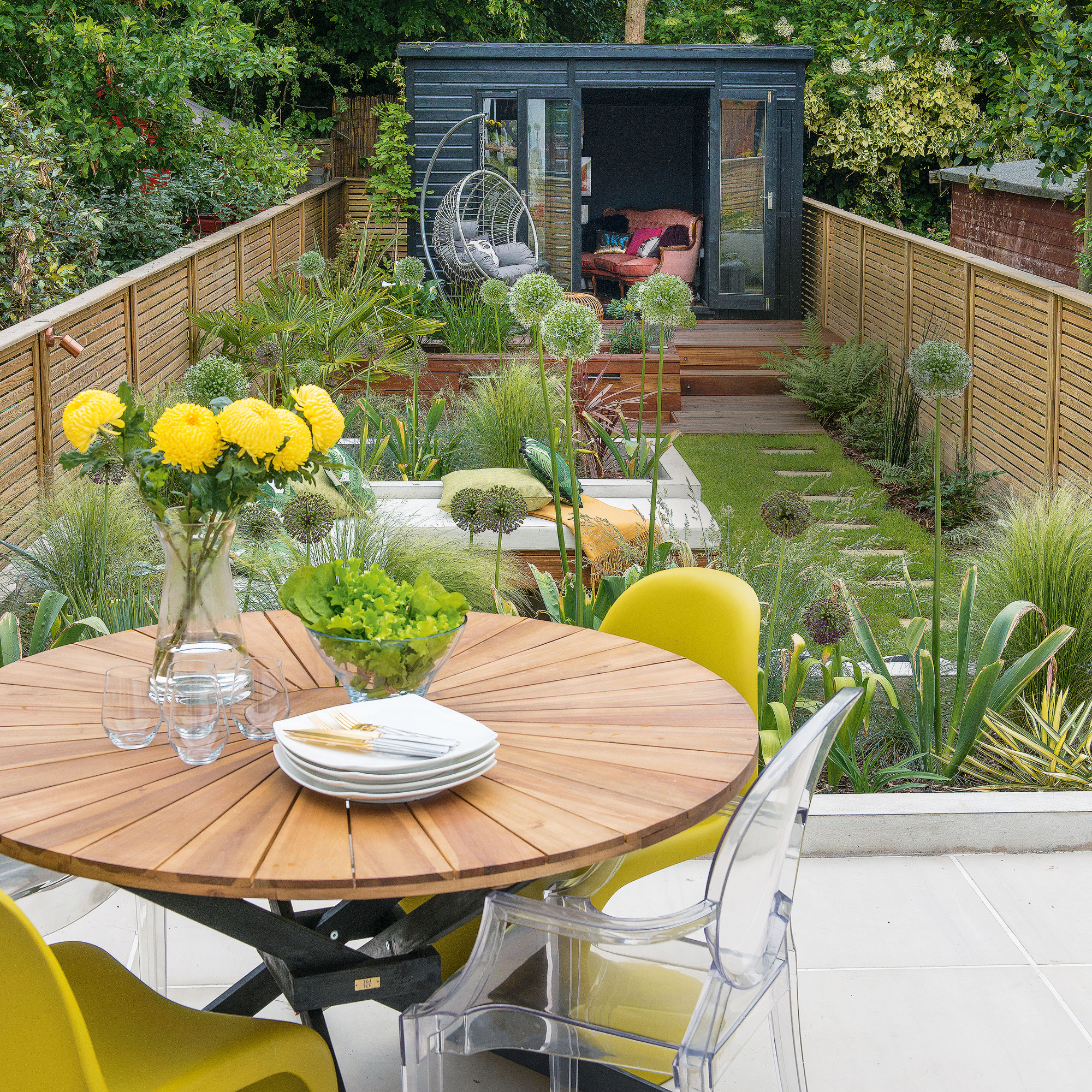
A long garden offers a great opportunity for a garden room or home office at the bottom, a space where you can WFH or enjoy a little peace and quiet, removed from day-to-day family life. It’s a great way to divide up the space into more useable spaces.
Use different landscaping to break up the route to the garden room or home office, adding interest to your route.
22. Paint fences black
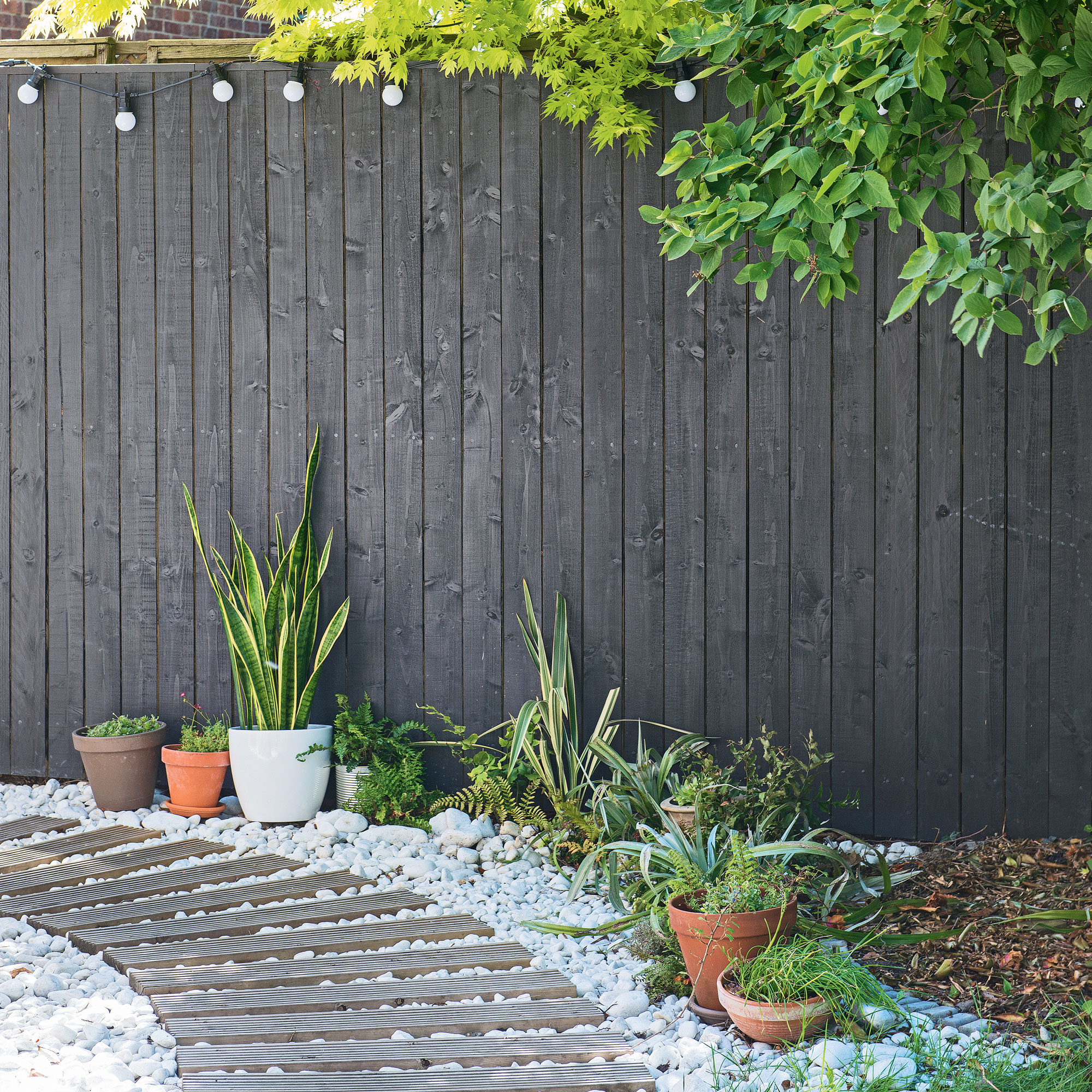
If you have a narrow garden but get a lot of natural light you can go bold and paint your fence black. Visually push the sides of your garden out by painting your boundary fences black. While this might seem strange, it works by making any planting pop, adding layers of interest and depth – your eye thinks the space is bigger than it is.
Your plot appears wider because you have taken the focus away from the fence. It’s a great small budget garden idea too.
23. Design a feature out of steps
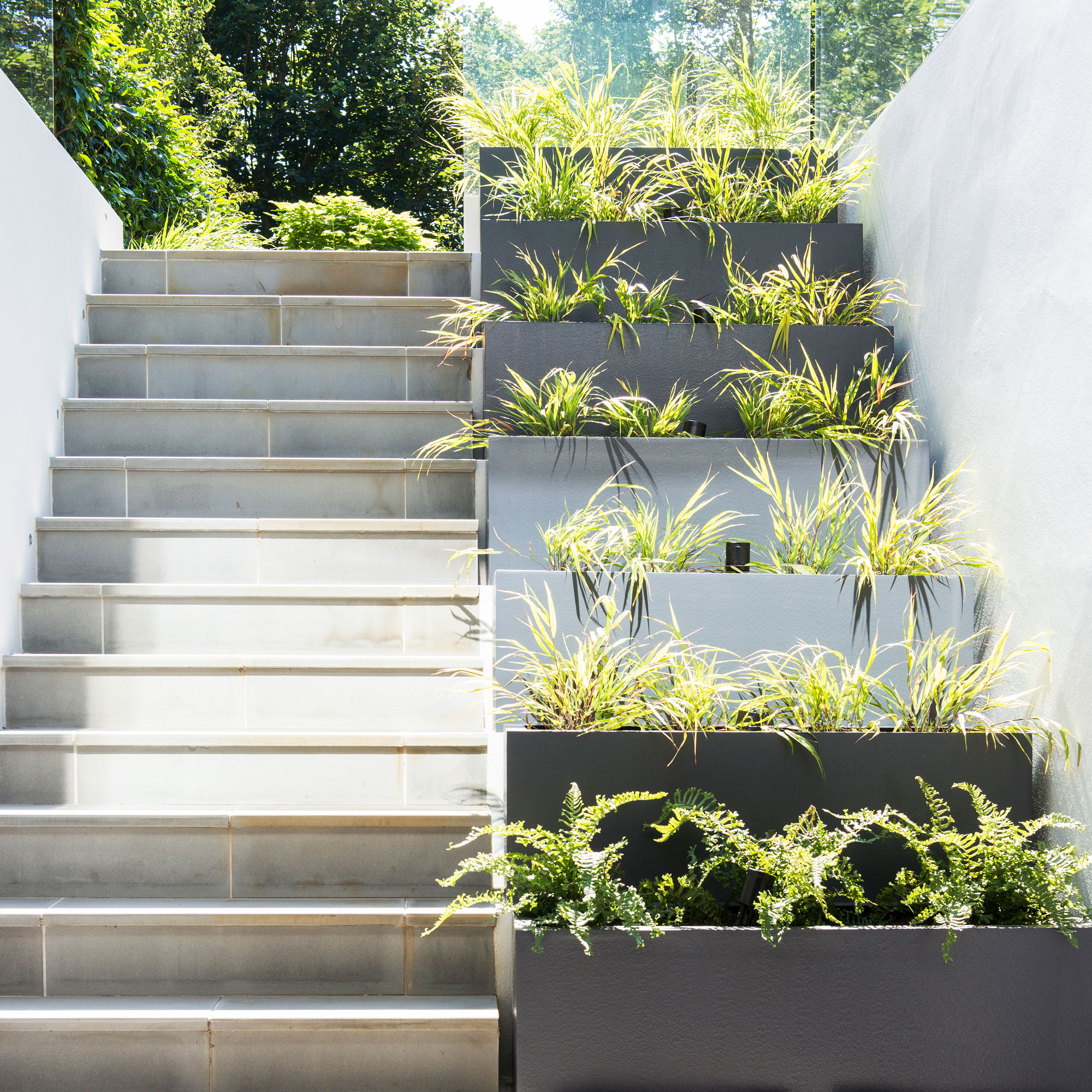
If your narrow garden is vertical, like a bank of steps leading to a deck, then avoid the temptation to run steps across the entire width thinking it will make it feel wider. Try a stepped planter design instead, with each one double the height of a step.
The planters can be planted with ferns and grasses, which balances the architectural lines of the steps.
24. Make use of the walls
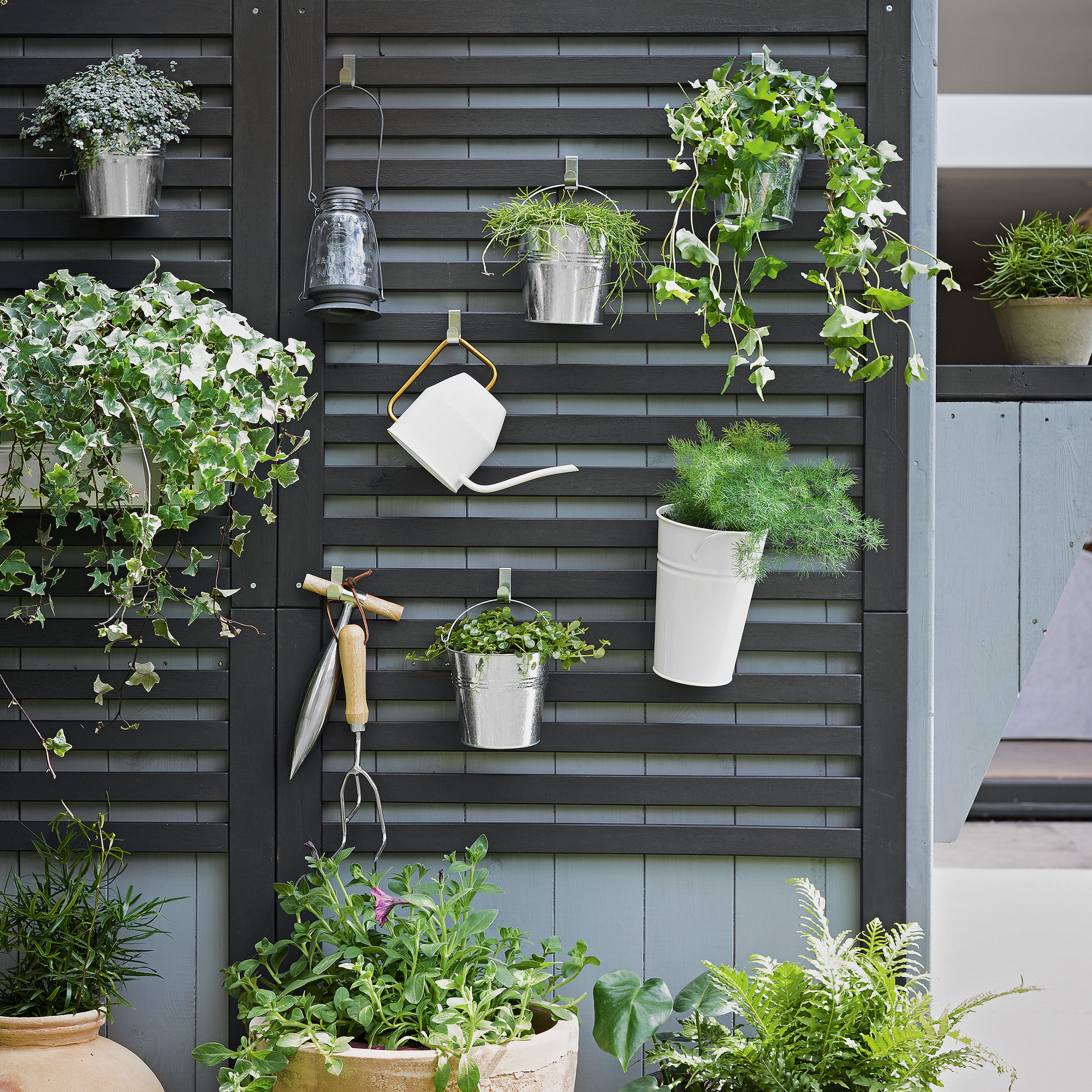
In a narrow garden, think high and utilise the walls for a vertical herb garden, which can hang above pots and planters from trellis or a timber frame. Again, leading the eye up, detracts from a long garden.
You can also use this idea to screen off sections of your garden – just secure into a raised planter placed at a right angle to your boundary fence.
FAQs
How can I zone a narrow garden?
A great way to zone your narrow garden ideas is to use your borders to help you create distinctive zones. Create garden border ideas with plants, flowers or fencing which can also add colour and texture to your garden. Use fencing to create vertical planting using plants such as ferns, vines, bromeliads, lipstick plants and succulents. A vegetable border allows you to get green-fingered and grow your favourite vegetables while minimising waste and saving money on food.
Another clever way to zone your garden is to use different levels, terrains and features. ‘Think about having a grassy lawn as well as some decking and gravel, creating two obvious zones without a harsh border,’ says Rian from Leisure Bench.
How do you lay out a narrow garden?
‘If you're big on entertaining in the garden, think about using either the bottom of the garden or the top of the garden for this,' advises garden expert Rian Habergham. 'Installing decking is a great way to section this area off, and create a lovely space for tables and chairs to be placed comfortably. If you do a lot of dining outdoors, the closer to your house (and therefore the kitchen) the better, but if you enjoy relaxing and socialising in your garden, the bottom of your garden is likely to be more private and cosy.'
Don’t place furniture in the middle of the garden because this cut through the middle of the garden and makes it look even narrower. Instead, place the furniture at the top or bottom of the garden to accentuate the sense of space. Don’t include too many large pieces of furniture, opt for small or medium furnishings and decorative pieces and only one or two large items.
‘Generally, you will want to keep the middle section of your garden free from furniture so that it can be a space for children to play, or a space to install a water feature or grow a vegetable patch/flower bed,' adds Rian. 'What you choose to do with the middle section is completely up to you, and you should think about how you want to use your garden before you make any decisions.'
The most important thing to bear in mind when embarking on a project for your slender space? To see your narrow garden ideas as an opportunity to really work out what you want from your outdoor area, and go on to make it happen. Have fun!

Jennifer Morgan is an award-winning editor, writer and stylist, with over 25 years’ experience writing, styling and editing home interest magazines. Jennifer was the deputy editor of Ideal Home from 2008-2010, before launching Ideal Home’s sister title, Style at Home in 2010. Jennifer went on to launch several craft magazines and websites, before going freelance in 2016, with a client list that includes John Lewis, Dunlem and Nordic House. Today, she writes for Ideal Home, Real Homes, Waitrose, Woman & Home, Sainsbury’s Magazine and Homes & Gardens.
- Thea Babington-StittManaging Editor
-
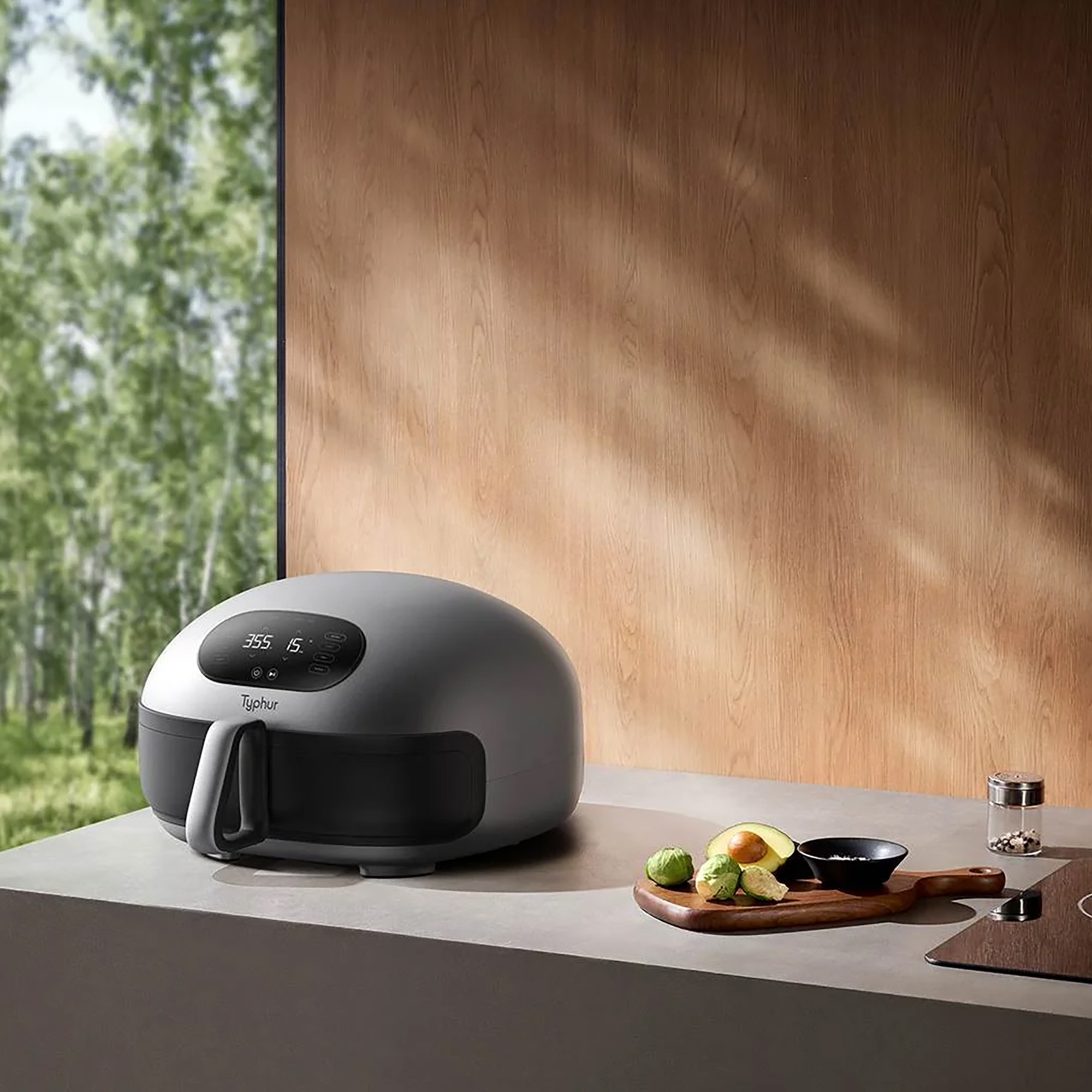 Typhur Dome 2 air fryer review – a glimpse into the future of air frying
Typhur Dome 2 air fryer review – a glimpse into the future of air fryingThe Typhur Dome 2 cooks food brilliantly and has all sorts of benefits, but is it worth the £499 price tag?
By Ellen Manning
-
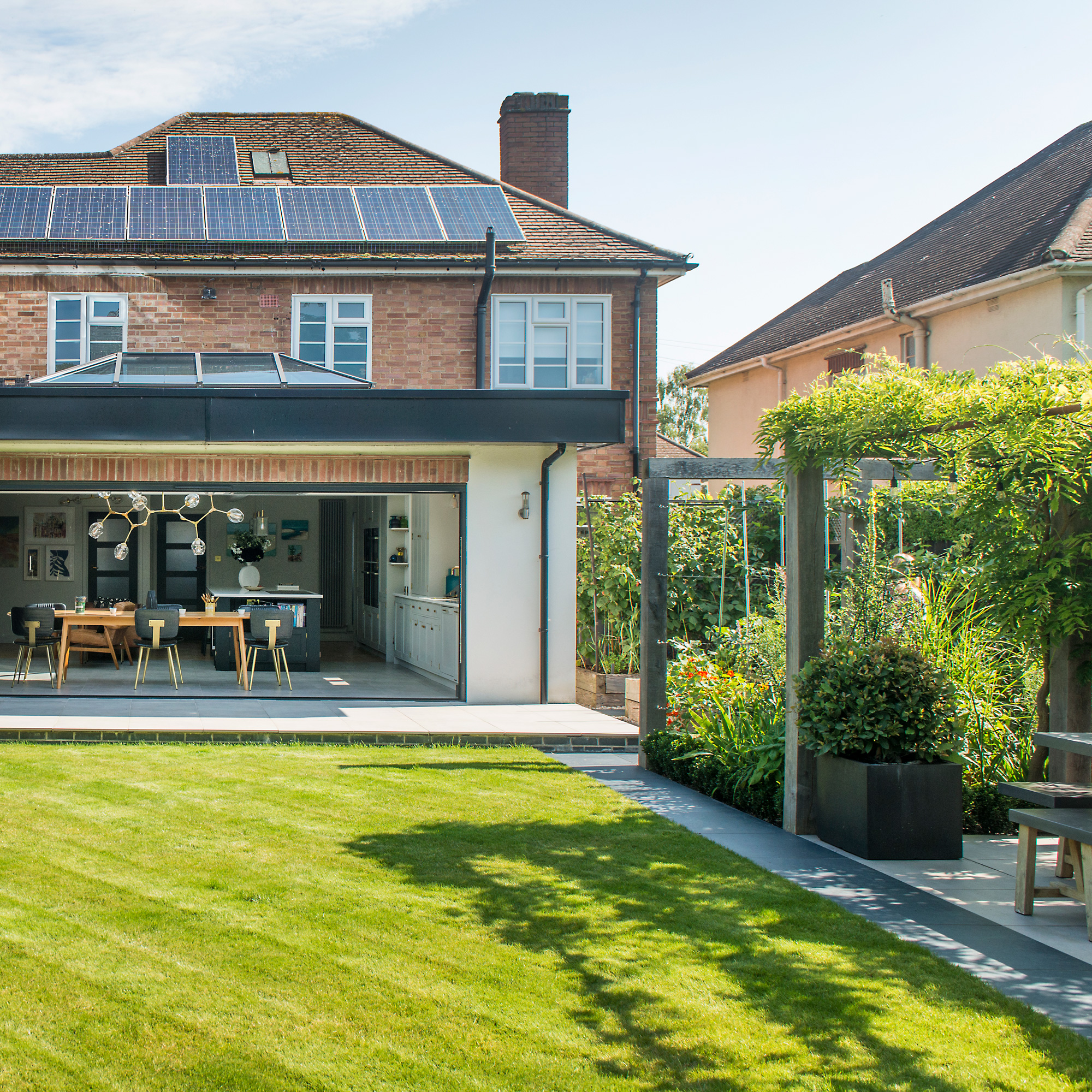 In creating their lush multi-use garden, the owners have cleverly futureproofed the space for years to come
In creating their lush multi-use garden, the owners have cleverly futureproofed the space for years to comeWith a zone for dining, a veg plot, a relaxing sun trap, and space for quiet contemplation
By Ginevra Benedetti
-
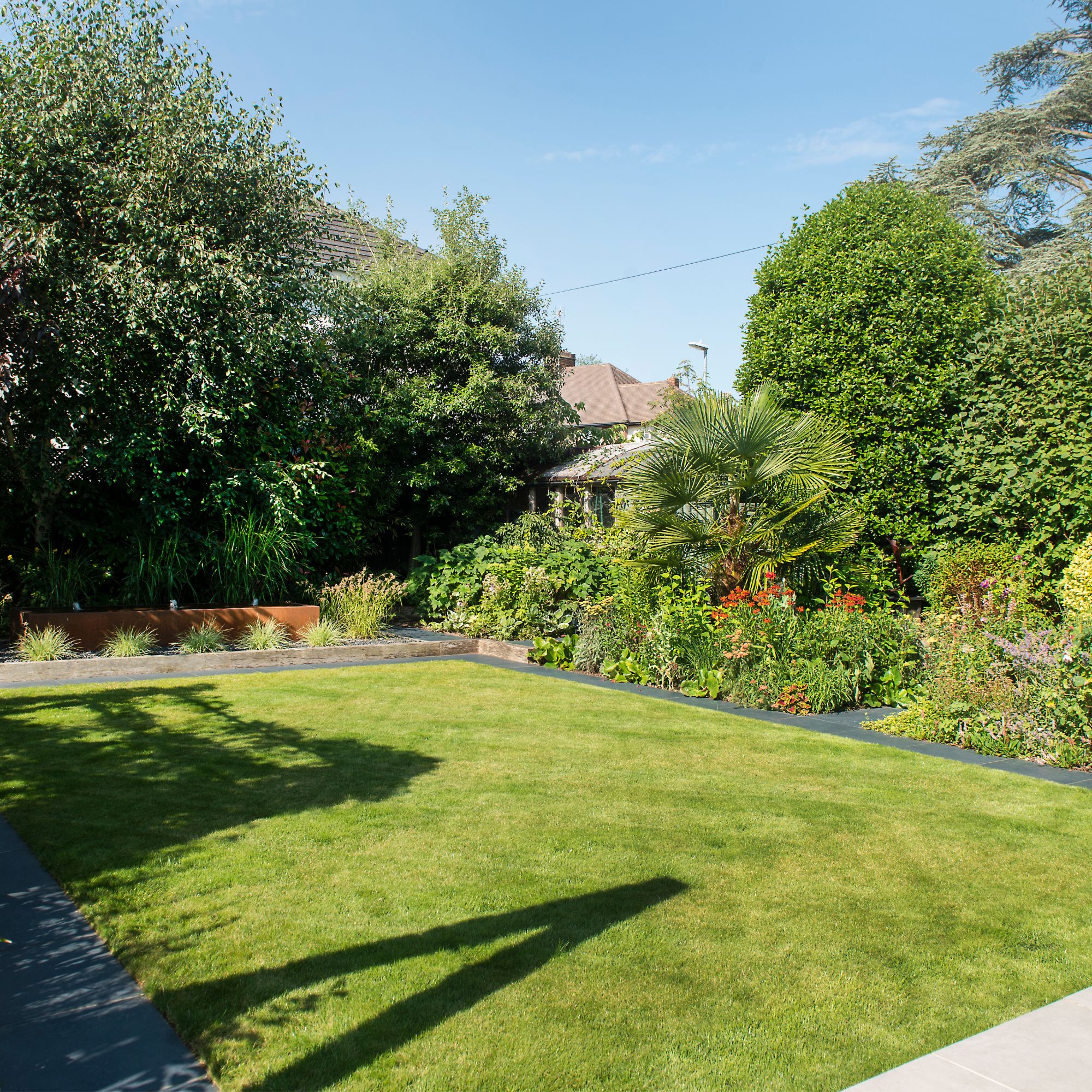 5 reasons why your grass seed isn’t growing and what you can do to help, according to garden experts
5 reasons why your grass seed isn’t growing and what you can do to help, according to garden expertsFor a lush, green lawn, you have to ensure the conditions are just right
By Kezia Reynolds